#spidey sense is basically a character that only the reader is aware of
Explore tagged Tumblr posts
Note
What is the extent of the spider sense in LOF? Like does it only focus on general danger which could affect a lot of ppl (including peter) or would it also get peter to stop someone from poisoning themselves (alt: stop tim from eating a salami or smth HAHA)
i've been meaning to ramble about his spider-sense for everybody and i'm using this ask as my excuse tyyyyy
his spider-sense as we read it isn't exactly what's actually happening. for the readers, we see:
!!! or ??? or even words like 'MOVE!!!"
but that's mostly for our benefit. it's like a comic book page but in fanfic format. i took a page out of ITSV for this concept (because this scene where everything goes silent and Miles gets that spider-sense for the first time??? BRILLIANT)

peter's not hearing these words or even aware of them, he's feeling his spider-sense and interpreting what is going on. the words and stuff is so we as readers know what's happening and what the clue is + it's us figuring out at the same time as peter what is being "said."
and that's because his spider-sense is a mix of all of his senses!! i kept the danger detection but i added a mix of it being that all those tiny spider hairs on peter's body are helping him "see" the world in a far different way than humans. all of his senses are tuned up so high that it creates the "spidey-sense" that i write in LoF. so when we see 'get away' or 'run' or 'jump!' or 'catch!' it's not just the detection of his spider-sense and it feeling 'danger', but that peter had subconsciously seen signs that something is going to happen, or heard something. like when Haley took off in chapter 16 and Peter's spider-sense picked up on it, it was because Peter had seen her muscles tensing and saw her look over, but he didn't consciously recognize it. his body i smore aware of what's going on than peter's mind is, and that's a good thing because if peter were even more fine tuned into his senses he would stay overwhelmed.
(this is where some batman training would come in... picking up the clues faster without overwhelming himself. peter also needs someone to train him on how to rely on the spider-sense. no one in the Avengers really knows what this is like for him and so he's entirely self-taught when it comes to his spider-sense, whereas the Justice League has more experience, and also batman.)
so yeah!! if Tim was about to eat salami (for anyone still confused by that, people without spleens need to avoid eating processed meats), Peter would likely pick up on it and that spider-sense would tingle. he's far more aware of his surroundings than what shows when you look at him
#erinwantstowrite#ao3#ao3 fanfic#leap of faith ao3#peter parker#spidey-sense#spidey sense#spidey sense is basically a character that only the reader is aware of#thank you for the ask!#peter parker in gotham
181 notes
·
View notes
Note
Hello! I was wondering if you could please write something about how the Fellowship (+ Thorin?) Would help a s/o who's Disabled and Chronically ill. Like she has a lot of symptoms like chronic pain, chronic fatigue, difficulty sleeping, difficulty breathing at times, difficulty walking at times, higher sensitivity to the cold, difficulty talking at times, and anxiety, depression and executive dysfunction?
I've been really struggling with my chronic illnesses lately, namely my Autism, Anxiety, Sleep Apnea, a really bad Overbite, Raynaud's Syndrome, Asthma, etc, so I'd really appreciate an Imagine like this. I have a really weird disorder where one of my legs is longer than the other, and it's been causing me a lot of pain and difficulty walking lately, and people have been bullying me for it a lot too, so I could really use a Comfort Imagine right now. Thanks so much hun!!
It's no problem! I'm glad I can provide some comfort!! For each character, I'll use a specific struggling area, to make it a bit easier!! I hope I got these accurate enough, and of there are any mistakes, feel free to point them out!! You are strong, beautiful and so, so amazing!! Keep being you!! ❤❤
Help (The Fellowship// Thorin x Fem!Reader)
Aragorn (Autism)

Aragorn has known you for a long time, so helping with your autism is not new for him
He's particularly experienced in reading your emotions and meeting your needs, whether it's helping you out of stressful situations or calming you down, he's there 🥺
If there are large and boisterous gatherings in Rivendell, its almost guaranteed that you can become over-stimulated quickly, and Aragorn immediately senses this (spidey senses õoõ)
He's fast to find your hand and give it a gentle squeeze of reassurance
If that doesn't seem to help, he'll instantly stop what he's doing and take you out of the room
If you're someone who prefers lots of space and little physical contact, he is 100% respectful of this and asks if you'll let him touch or hug you (very much gentleman 😌)
If ever you're confronted by someone of importance, Aragorn is right by your side to ease some of the tension
Sometimes there are things you find difficult to say or get out of your system
The king seems to know exactly what it is and will help you out by saying it or asking you simple questions that you can easily answer
And he always reminds you, no matter WHAT
YOU ARE NOT STUPID 😤😡
You may struggle with some parts of your life, but every day, he's constantly telling you that you're very intelligent and kind
His patience is unending and he'll never let you think down on yourself
Overall, Aragorn is always someone and reminding you that it's all going to be okay ❤❤
Legolas (Anxiety)
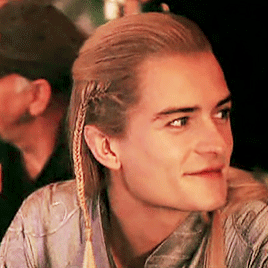
Most nights, Legolas keeps watch (since elves don't require much sleep) and notices that you jolt awake out of the random
Now, most of the Fellowship notices that you're usually awake and ready to go before anyone else
But Legolas is really the one to address you first
You were a bit nervous to explain, since you didn't want to worry him or the great of the fellowship, amount the other disadvantages you have
He gently encouraged you, and finally, you explained to him your sleep apnea
Yeah, he was very concerned
I mean, his blue eyes widened with terror when you told him that you could basically die in your sleep if you weren't attentive enough 🙃
Legolas, from now on, sleeps directly next to you, or keeps extra careful watch over you at night
Because he could NEVER see his precious mortal friend become injured... Or worse 🥺🥺❤
The other members had noticed a change in his behaviors towards you as well...
Gimli teased him whenever he caught Legolas giving you some extra lembas bread or offered to carry you 👉👈
You really tried to assure Legolas that it wasn't a big deal when you were awake, since you're aware of your breathing situation
But still 😤
Legolas will always bring you comfort and take great care of you, and that will NEVER CHANGE
Because he loves you very much ❤🦋
Frodo (Anxiety)
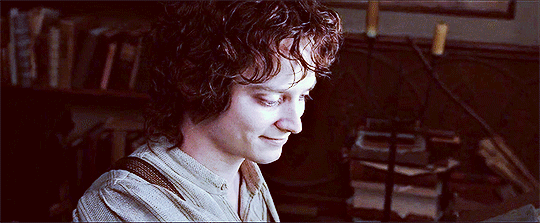
Frodo is familiar with the feeling of great anxiety, seeing he had a stress-free life while living in the Shire and suddenly was forced to carry a piece of jewelry all the way to giant ass volcano
It's easy for you two to comfort each other and seek refuge in thoughts and feelings ❤
He's not super comfortable with the thought of you having a panic attack though...
Only because he's never had one
It starts to give him a panic attack whenever you have one around him the first time 😳-
Any time you begin to breathe heavy or hyperventilate, halfling boy is hot at your heels, rubbing your back and reminding you to breathe gently
(So many hugs, if you're up for it)
After you calm down, he's constantly checking on you, asking if you need anything etc.
Really, he just wants to know if he can help 🥺
And even with the weight and stress of carrying the ring, Frodo manages to cheer you up somehow
Samwise (Asthma)
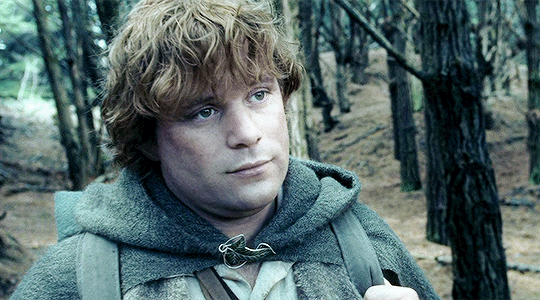
Sam has never had to deal with asthma once in his life
He's very nervous when the subject is brought, afraid it might trigger something inside of you 🥺👉👈
But you just chuckle, assure him that it's alright, and you have ways of keeping it under control
And now, he wants to know everything about it, just to have the awareness in case something happens
Sam just wants to protect you forever, and this was a great way for him to start
He constantly reminds Aragorn that you'll need breathing breaks and will convince Gandalf to let you ride on his horse
He'll scold Pip and Merry if they are trying to drag you around and be silly, because as he says
"You'll rouse him/her/them up! We can't have Y/N gettin injured!" 🤨😠
Sam is MOM
As always, he's very kind and always makes sure your needs are met ❤🥺
Pippin and Merry (Raynaud's Syndrome)
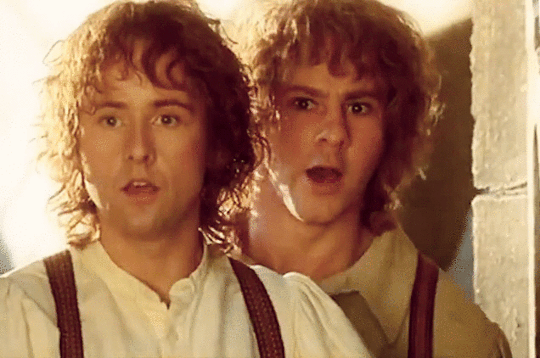
Very confused halfings 🤔
Also extremely concerned!
You were eating one of the lesser pleasurable nights
It was cold and rainy, and a fire couldn't be started, not to mention the quiet arguments of Aragorn and Gandalf in the nearby woods
And Pip's eyes widened when he saw the tips of your petite fingers begin to pale upon hearing Aragorn mention Orcs
"What's wrong with your hands?!" He squeaked, pointing towards your now white-colored fingertips
You hadn't even noticed, nor felt, considering they were numb anyways
Merry looked over his cousin's shoulder and his eyes also widened, not with fright, but wonder
They were both fascinated with your condition, convinced that you were casting some spell Gandalf showed you
Although you reassured them it was just an extremely frustrating inconvenience that you had, among other things
So from then on, the disastrobus duo did their best to keep you out of the cold (and stressful situations!!)
As a distraction, the pair will tell you great stories of the shire, doing little dances and skits that always cheer you up 🥴
Sometimes, they can be a little rambunctious though...
Merry will pick up on this fact quickly, and nudge Pippin to get him to calm down
Even though it may not feel the best
They find your syndrome absolutely fascinating!! 🤔🤔
All in all, these two are always up for keeping your beautiful smile on your face and your spirits high!! ❤🌺
Boromir (Depression)

Throughout the journey, Boromir has always found an easy way to make you smile
After all, he himself has a fascinating way of brightening anyone's spirits
Yours included ❤
Boromir may not have great stories from The Shire, like Pip and Merry, but he sure has a lot of positive things to say
He'll often suggest sparring with the two troublemaking halflings, just so you can see him goof up and get knocked over 🥺
If the nights become cold and weary, he'll give you a warm hug or a nudge on the shoulder
And a few words of helpful encouragement along the lines of;
"Don't fret Y/N. You have more strength than you'll ever know."
"Let our spirits never dampen! We've come this far!" 😊
He's also an incredible listener
Boromir wants to hear what you have to say if you ever need to rant or get something off of your chest
And don't think for a second that he would ever judge you 😤
Son of Gondor sees past all of your insecurities and knows you for your beautiful, amazing self ❤❤
Gimli (Walking disadvantages)
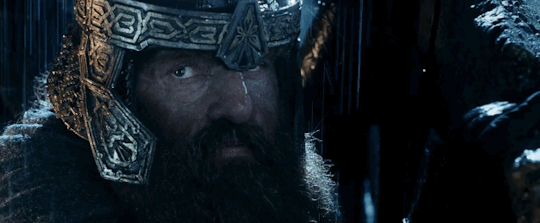
As you travel across great plains and mountains, your limp doesn't go unnoticed by Gimli
It may take him a while to open up about it, since he's afraid he might offend you in some way
And once he asks you, you inform him that it's a difficulty that unfortunately cannot be changed any time soon
And where you come from, lots of people tease and bully you about it
He did NOT handle it well 😳
"wHAT BLUBBERING DULL-MINDED PIGNUTS-" 🤬
Although this Dwarf is short and a bit slow at times
He's fascinatingly strong 😳
And so, he makes it his duty to be your designated carrier 🥺
At first, your a tad skeptical...
I mean, he's only around 4 feet tall...
BUT HAVE YOU SEEN HIM THROW THAT HUGE AX AROUND?!
Gimli will happily carry you great distances when you need a break, and even longer
(Sometimes it's just to show off around the others-)
"Gimli, are you sure you don't want a break?"
"Aye lass! The strength of Dwarves is unending!" 😌
*struggling to breathe*
11/10, fantastic dwarf, will never let you down!!
Thorin (Executive Dysfunction)

Another Dwarf??
Absolutely
Thorin himself has trouble keeping composure with his time management (and sense of direction 🙄)
This means that he'll have an undying amount of patience for you and you only
There's just something about you that he fond of, and it fills in that little sassy, brooding place in his heart
Can also relate to you whenever you grow frustrated at the setback of your journey or lack of sleep
Is 100% willing to help you find your lost belongings (and once again, ONLY YOU)
Thorin will literally make the whole traveling party stop so that you can put something in your bag and make sure that you put it somewhere you'll remember
Always happy to give you extra gentle reminders of keeping your pack closed
The company is utterly SHOCKED with how he treats you
I mean, this man has always been extremely stubborn and hard headed
But when you show up, it's another person he can easily relate and share frustrations with
Also a master at organization?!? 🤔
The one thing he could do successfully was organizing the damn journey and traveling company, so ofc he's gonna be good at that 😂
Yeah, Thorin definitely has a soft spot for you
King under the mountain will never run out of patience and kindness for you 😌💙
Sorry these took so long!! I hope you like them!! ❤❤
#thorin oakenshield#frodo baggins#xreader#gimli#legolas#merry brandybuck#pippin took x reader#pippin took#thorin oakenshield x reader#legolas x reader#gimli x reader#aragorn x reader#aragorn#frodo+x+reader#merry brandybuck x reader#boromir x reader#boromir#headcanons#mental illness#autismn awareness#executive dysfunction#lotr x reader#the hobbit
386 notes
·
View notes
Note
So, I don't think I've ever asked you this... what IS the whole point of the Spider-Sense? It really seems like something that only exists for writers to ignore or work around when they want to inject Legit Tension into a story.
I’ve thought about this power so much, but never with an eye to defend its right to exist, so I needed to think about this. The results could be more concise.
Ironically, given the question, I have to say its main purpose is to ramp up tension. But it’s also a highly variable multitool that a skilled creative team can use for...pretty much anything. It does everything the writer wants it to, while for its wielder always falls just short of doing enough.
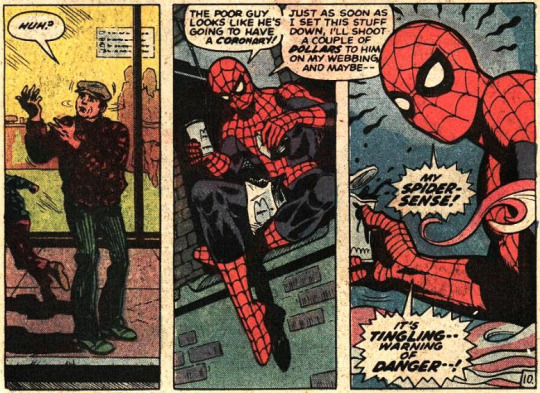
I went looking through my photos for a really generic, classic-looking example to use as an image to head this topic, but then I ran into the time Peter absolutely did not reimburse this man for his stolen McDonald’s, so have that instead.
A Scare Chord, But You Can Draw It
That one post that says the spider-sense is just super-anxiety isn’t, like, wrong. It’s a very anxious, dramatic storytelling tool originally designed for a very anxious, dramatic protagonist. I find it speaks to the overall tone of the franchise that some characters are functionally psychics, but with a psychic ability that only points out problems.
Spidey sense pinging? There’s danger, be stressed! Broken? Now the lead won’t even KNOW when there’s a problem, scary! Single character is immune to it? That’s an invisible knife in the dark oh my god what the fuck what the fU--
Like its counterpart in garden variety anxiety, the only time the spider-sense reduces tension is in the middle of a crisis. But in the wish fulfillmenty way that you want in an adventure story to justify exaggerated action sequences, the same way enhanced strength or durability does. Also like those, it would theoretically make someone much safer to have it, but it exists in the story to let your character navigate into and weather more dangerous situations.
For its basic role in a story, a danger sense is a snappy way to rile up both the reader and the protagonist that doesn’t offer much information beyond that it’s time to sit smart because shit is about to go down.
Spidey comic canon is all over the board in quality and genre, and it started needing to subvert its formulas before the creators got a handle on what those formulas even were, and basically no one has read anything approaching most of it at this point, so for consistent examples of a really bare bones use of this power in storytelling, I’d point to the property that’s done the best job yet of boiling down the mechanics of Spider-Man to their absolute most basic essentials for adaptation to a compelling monster of the week TV series.
Or as you probably know it, Danny Phantom. DON’T BOO, I’M RIGHT.
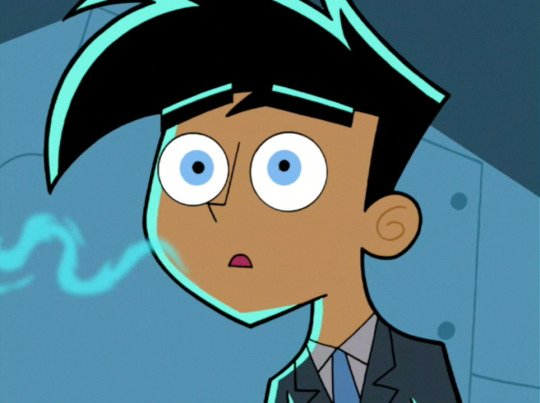
DP is Spider-Man with about 2/3 of the serial numbers filed off and no death (ironically), and Danny’s ghost sense is the most proof in the formula example of what the spidey sense is for: It’s a big sign held up for the viewer that says, “Something is wrong! Pay attention!” Effectively a visual scare chord. It’s about That Drama. And it works, which won it a consistent place in the show’s formula. We’re talking several times an episode here.
So why does it work?
It’s a little counterintuitive, but it’s strong storytelling to tell your audience that something bad is going to happen before it does. A vague, punchy spoiler transforms the ignorant calm before a conflict into a tense moment of anticipation. ...And it makes sure people don’t fail to absorb the beginning of said conflict because they weren’t prepared to shift gears when the scene did. Shock is a valuable tool, too, but treating it like a staple is how you burn out your audience instead of keeping them engaged. Not to go after an easy target, but you need to know how to manage your audience’s alarm if you don’t want to end up like Game of Thrones.
The limits of the spider-sense also keep you on your toes when handled by a smart writer. It tells Peter (everyone’s is a little different, so I’m going to cite the og) about threats to his person, but it doesn’t elaborate with any details when it’s not already obvious why, what kind, and from what. And it doesn’t warn him about anything else-- Which is a pretty critical gap when you zoom out and look at his hero career’s successes and failures and conclude that it’s definitely why he’s lived as long as he has acting the way he does, but was useless as he failed to save a string of people he’d have much rather had live on than him.
(Any long-running superhero mythos has these incidents, but with Peter they’re important to the core themes.)
And since this power is by plot for plot (or because it’s roughly agreed it only really blares about threats that check at least two boxes of being major, immediate, or physical), it always kicks in enough to register when the danger is bearing down...when it’s too late to actually do anything about it if “anything” is a more complex action than “dodge”.
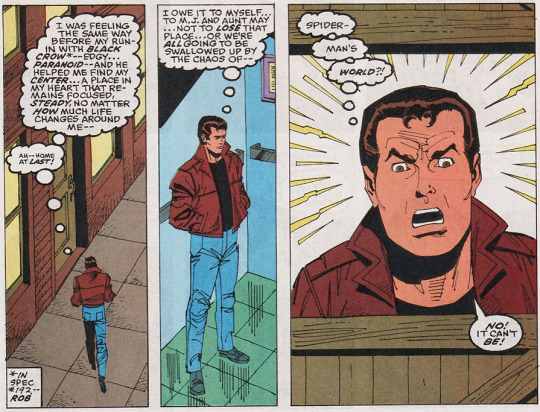
Really? Not until the elevator doors started to open?
That Distinctive, Crunchy Spider Flavor
The spider-sense and its little pen squiggles go hand in hand with wallcrawling (and its unique and instantly identifiable associated body language) to make the Spider-Person powerset enduringly iconic and elevate characters with it from being generic mid-level super-bricks. Visually, but also in how it shapes the story.
I said it can share a narrative role with super strength. But when you end a fight and go home, super strength continues to make your character feel powerful, probably safer than they’d be otherwise, maybe dangerous.
The spider-sense just keeps blaring, “Something’s wrong! Something’s wrong! God, why aren’t you doing something about this!?”
Pretty morose thing to live with, for a safety net! Kind of a double edged sword you have there! Could be constantly being hyperattuned to problems would prime you for a negative outlook on life. Kind of seems like a power that would make it impossible for a moral person to take a day off, leading them into a beleaguered and resentful yet dutiful attitude about the whole superhero gig! Might build up to some of the core traits of this mythos, maybe! Might lead to a lot of fifteen minute retirement stories, or something. Might even be a built in ‘great responsibility’ alarm that gets you a main character who as a rule is not going to stop fighting until he physically cannot fight anymore.

Certainly not apropos of anything, just throwing this short lived barely-a-joke tagline up for fun.
One of my personal favorite things about stories with superpowers is keeping in mind how they cause the people who have them to act in unusual ways outside of fights, so when you tell me that these people have an entire extra sense that tells them when the gas in their house is leaking through a barely useful hot/cold warning system that never turns off, I’m like, eyes emojis, popcorn out, notebook open, listening intently, spectacles on, the whole deal.
It also contributes to Peter Parker’s personality in a way I really enjoy: It allows him to act like an irrational maniac. When you know exactly when a situation becomes dangerous and how much, normal levels of caution go out the window and absolutely nothing you do makes sense from an exterior standpoint anymore. That’s the good shit. I would like to see more exploration of how the non-Parker characters experiencing the world in this incredibly altered way bounce in response.
It’s also one of many tools in this franchise hauling the reader into relating more closely with the main character. The backbone of classic Spidey is probably being in on secrets only Peter and the reader know which completely reframe how one views the situation on the page. It’s just a big irony mine for the whole first decade. A convenient way to inform the reader and the lead that something is bad news that’s not perceivable to any other characters is youth-with-a-big-exciting-secret catnip.
Another point for tension, there, in that being aware of danger is not synonymous with being able to act on it. If there’s no visible reason for you to be acting strange, well...you’re just going to have to sit tight and sweat, aren’t you? Some gratuitous head wiggles never hurt when setting up that type of conflict.
Have I mentioned that they look cool? Simultaneously punchy and distinctive, with a respectable amount of leeway for artists to get creative with and still coming up with something easily recognizable? And pretty easy to intuit the meaning of even without the long-winded explanations common in the days when people wrote comics with the intent that someone could come in cold on any random issue and follow along okay, I think, although the mechanic has been deeply ingrained in popular culture for so long that I can’t really say for sure.
It was also useful back in the day when no artists drew the eyes on the Spider-Man mask as emoting and were conveying the lead’s expressions entirely through body language and panel composition. If you wiggle enough squiggles, you don’t need eyebrows.
Take This Handwave and Never Ask Me a Logistical Question Again
This ability patches plot holes faster than people can pick them open AND it can act as an excuse to get any plot rolling you can think of if paired with one meddling protagonist who doesn’t know how to mind their own business. Buy it now for only $19.99 (in four installments; that’s four installments of $19.99).
Why can a teenager win a six on one fight against other superhumans? Well, the spider-sense is the ultimate edge in combat, duh.
Why can Peter websling? Why doesn’t everyone websling? Well, the spider-sense is keeping him from eating flagpole when he violently flings himself across New York in a way neither man nor spider was ever meant to move.
How are we supposed to get him involved with the plot this week???? Well, that crate FELT dangerous, so he’s going to investigate it. Oh, dip, it was full of guns and radioactive snakes! Probably shouldn’t have opened that!
Yeah, okay, but why isn’t it fixing everything, then? Isn’t it supposed to be why Peter has never accidentally unmasked in front of somebody? ('Nother entry for this section, take a shot.) That’s crazy sensitive! How does he still have any problems!? Is everything bad that’s ever happened to characters with this powerset bad writing!? --Listen, I think as people with uncanny senses that can tell us whether we are in danger with accuracy that varies from incredible to approximate (I am talking about the five senses that most people have), we should all know better than to underestimate our ability to tune them out or interpret them wrong and fuck ourselves up anyway. I honestly find this part completely realistic.
*SLAPS ROOF OF SPIDER-SENSE* YOU CAN FIT SO MANY STORIES IN THIS THING
The spider-sense is a clean branch into...whatever. There is the exact right balance of structure and wishy-washiness to build off of. A sample selection of whatevers that have been built:
It’s sci-fi and spy gadgets when Peter builds technology that can interface with it.
It’s quasi-mystical when Kaine and Annie-May get stronger versions of it that give them literal psychic visions, or when you want to get mythological and start talking about all the spider-characters being part of a grand web of fate.
Kaine loses his and it becomes symbolic of a future newly unbound by constraints, entangled thematically with the improved physical health he picked up at the same time -- a loss presented as a gain.

Peter loses his and almost dies 782 times in one afternoon because that didn’t make the people he provoked when he had it stop trying to kill him, and also because he isn’t about to start “””taking the subway’’””’ “‘’“”to work”””’’” like some kind of loser who doesn’t get a heads up when he’s about to hit a pigeon at 50mph.
Peter’s starts tuning into his wife’s anxiety and it’s a tool in a relationship study.
It starts pinging whenever Peter’s near his boss who’s secretly been replaced by a shapeshifter and he IGNORES IT because his boss is enough of an asshole that that doesn’t strike him as weird; now it’s a comedy/irony tool.
Into the Spider-Verse made it this beautiful poetic thing connecting all the spider-heroes in the multiverse and stacked up a story on it about instant connection, loss, and incredibly unlikely strangers becoming a found family. It was also aesthetic as FUCK. Remember the scene where Miles just hears barely intelligible whispering that’s all lines people say later in the film and then his own voice very clearly says “look out” and then the room explodes?? Fuck!!!!
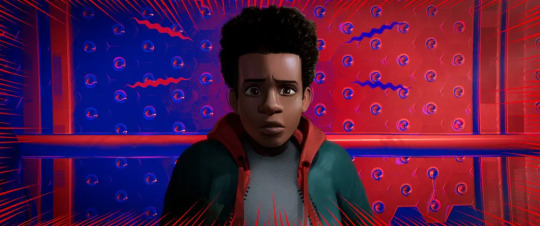
Venom becomes immune to it after hitchhiking to Earth in Peter’s bone juice and it makes him a unique threat while telling a more-homoerotic-than-I-assume-was-originally-intended story about violation and how close relationships can be dangerous when they go sour.
It doesn’t work on people you trust for maximum soap opera energy. Love the innate tragedy of this feature coming up.
IN CONCLUSION I don’t have much patience for writers who don’t take advantage of it, never mind feel they need to write around it.
#spiderman#peter parker#spiderverse#spidey#marvel#danny phantom#one day you'll see what i'm doing with it in the project i'm collabing on w/ my brother and then you'll all be sorry and hopefully impresse#mirrorfalls#asks answered#essays
1K notes
·
View notes
Text
The Not-So-Amazing Mary Jane Part 25: AMJ #2.1

Previous Part
Next Part
Master Post
Just like the first issue, I’m going to go through the issue page by page.
Believe it or not. the problems literally start on the recap page.
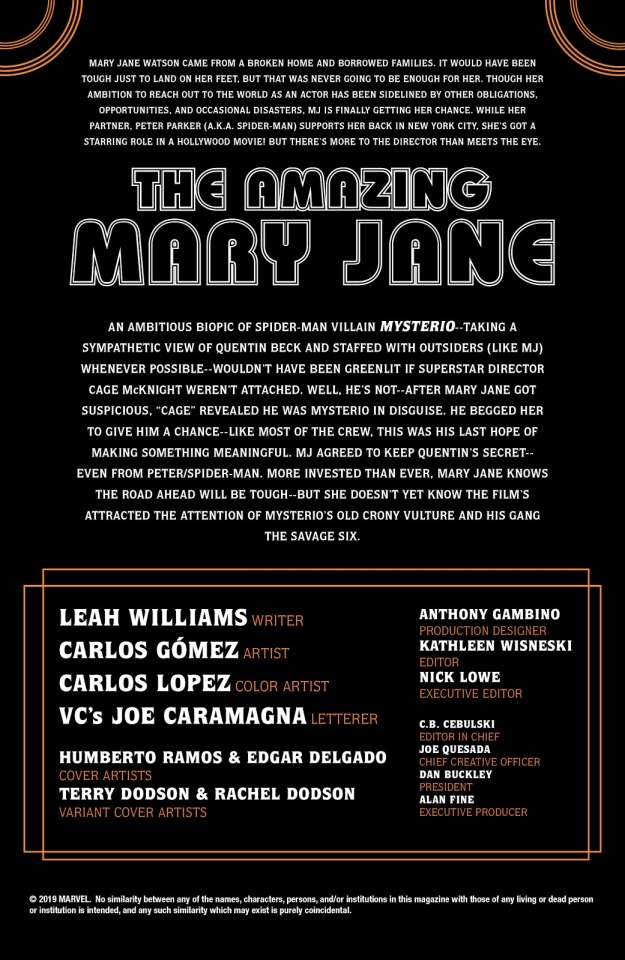
For starters check out this line:
....and staffed with outsiders (like MJ) whenever possible...
This is incredibly odd as it seemingly contradicts what issue #1 established.
I say seemingly because it depends upon how you define ‘outsiders’. Outside of what exactly?
The Hollywood system?
Traditional film or TV circles?
By those metrics the inclusion of so many criminals and former felons could fit the bill.
However, the recap lists Mary Jane as an example of such ‘outsiders’, which muddies the waters.
I suppose from a certain point of view she might be called an outsider but in context it doesn’t seem an appropriate descriptor at all.
Mary Jane has acting credits. She’s worked on Hollywood films before. She’s worked in TV before. She’s worked on stage before.
Alright, she’s not exactly Scarlett Johansson, but she’s not really an outsider.
More poignantly, the recap seems to be implying that MJ was included specifically because of her alleged outsider status. Putting aside how MJ isn’t really an outsider, this just doesn’t add up.
As detailed in parts 5-6, we the audience know that MJ’s inclusion is either due to:
Mysterio knowing about her connection to Spidey or
Kindred ordered Beck to include her.
The latter is the more likely answer. But even if it wasn’t the implication here is that Mysterio always wanted Mary Jane in his movie.
This is imbecilic of him because he is aware of her connection to Spider-Man!
Beck could be viewed as an obsessive and an egomaniac, but he’s not an idiot. If anything he is dangerously cunning. If he really just wanted an outsider actress with talent he’d have endless options other than Mary Jane to pick from.
Regardless of your feelings on the matter, the reality within Hollywood is that actors are a dime a dozen.
If Beck knows who Spidey is and therefore knows about MJ’s connection to him, he must have a specific reason for hiring her. He must have a particular need to keep her on set as he practically begged her to do in issue #1; a fact acknowledged in the recap itself. In fact in ASM v5 #25 Beck personally sought out Mary Jane’s former agent in order to get her into the movie. He didn’t look at a pool of actors and cast someone. He was incredibly specific.
Based upon the information we’ve been given, MJ’s connection to Spidey is the only explanation for all this. So what the Hell is this nonsense about her being an outsider? If he wanted an outsider why did he personally seek out Mary Jane?
I’m sorry, I can’t give the benefit of the doubt on this front. This is a clear cut example of incompetence. Either Williams and/or her editors weren’t paying attention to prior stories (including the first issue!) or they were and didn’t care.
Regardless it’s bad.
Moving on, we then have Cage McKnight referred to as a “superstar director”.
Wasn’t Cage supposed to be an indie director? Call me nuts but a ‘superstar director’ is surely someone like Spielberg or Ryan Coogler. An indie director is by definition not a superstar. It also further contradicts ASM v5 #29’s claims about McKnight harder to reconcile. In that issue McKnight was supposed to be a new and fairly unknown director.
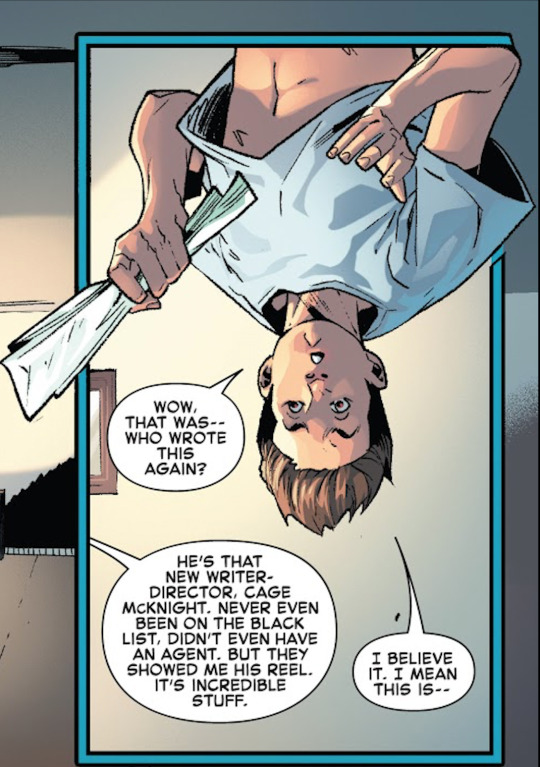

But I’ll let all that pass because he could be a super star on the indie scene.
Additionally, the recap in general fails to acknowledge the presence of criminals on set. They are simply referred to as outsiders and people who were on their ‘last hope of making something meaningful’. This totally obscures the reality of the situation and paints it as a lot less dangerous or irresponsible.
We then come to the most damning line in the entire recap.
MJ agreed to keep Quentin’s secret—even from Peter/Spider-Man.
That literally never happened in issue #1.
There was never a moment MJ agreed to keep Mysterio’s secret from Peter. Sure, we never saw her tell him the truth. But the story never highlighted the fact she was knowingly withholding information from him. She was incredibly casual about the film project and showed no signs of apprehension about lying to her partner.
It’s not even that Williams was being incredibly subtle. The first issue simply failed to ever acknowledge the fact that MJ was lying to Peter; she just did it!
More significantly the implication is that MJ is keeping this secret from Peter specifically because she’s sympathetic to Mysterio and his crew’s desire to make something meaningful. So I guess Williams is maintaining the mischaracterization from last issue huh? See prior instalments for why lying to Peter, sympathising with Beck and trusting him is OOC for Mary Jane.
Honestly, how would Matt Murdock feel about MJ letting Mysterio tell his magnum opus before he dies? The last time he was dying and decided he needed a magnum opus his girlfriend died!
Surely Karen or Gwyneth or any of the other innocent people Beck killed wanted the chance to do something meaningful with their lives too?
Why should Beck be afforded such an opportunity when he denied similar chances to people far more deserving?
Now granted this is just the recap page but the importance of a recap page is not to be underestimated.
Every comic is someone’s first, Stan Lee himself said that.
Recap pages are important as they give new readers the opportunity to jump on ship and thereby hopefully buoy up the sales as they naturally decline from issue #1 onwards.
Speaking from experience here, growing up my UK Marvel reprints had fairly detailed recap pages that provided enough context for me to pick up basically any issue and generally understand what was going on.
Having the recap contradict the actual story is misinforming and can thereby create a false impression of the work. Screwing it up is also just a bad sign for the rest of the comic. That’s particularly true when it’s providing details that weren’t actually present in the stories it is recapping.
Anyway, as we get into the story proper, we see MJ performing a scene from the movie.

I am not exactly sure if Williams is trying to make some commentary on Mary Jane here.
The dialogue her character says could be interpreted as commenting upon MJ’s growth as a character, on how she grew more capable of defending herself. Of how as she grew older she realised the real dangers in life were human beings not childish imaginings of monsters.
The main reason I suspect this might’ve been meant as commentary is that the dialogue specifically pints out how people wear masks to hide their true natures.
Masks are a recurrent theme in the Spider-Man mythos and particularly prevalent with MJ’s character.
If this was Williams intent it demonstrates a certain understanding of Spider-lore and of MJ that’s been woefully been lacking for most of the 2010s.
And one could justifiable argue the dialogue about how she grew stronger and more capable of defending herself is supported by her evolution over time. MJ never underwent a clear cut arc where she became more capable of defending herself. She was basically just shown to have bravery, common sense and resourcefulness. The frequent dangerous encounters she endured afforded her chances to put those skills into practice thus she got better at it, but she didn’t undergo active training towards that end like Batman.
Furthermore the dialogue can be argued to be talking about Mysterio as well, specifically the lines about monsters hiding behind pleasant masks. This is applicable to Mysterio’s masquerade as Cage McKnight.
However the comparison (if intentional at all) breaks down in two key areas.
The dialogue implies ‘Mary Jane’ learned that humans are the real monsters in life as she grew older. This is patently not true as MJ’s father was frequently abusive even when MJ was a baby.
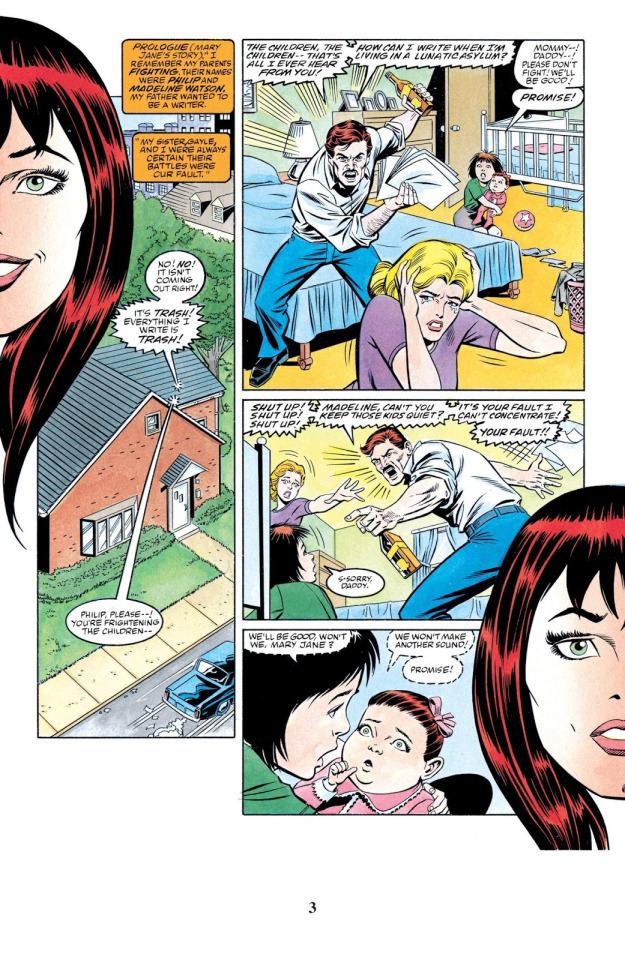
This was the norm for Mary Jane’s entire childhood and she herself created a mask of her own to cope with it.
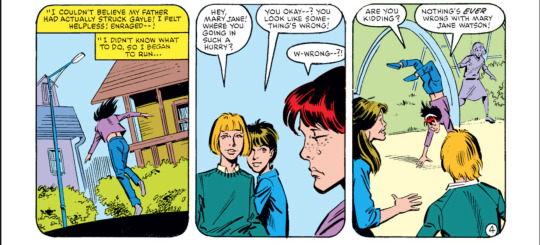
ASM #259
It was even implied MJ suspected Peter of being a ‘monster’ like her father precisely because she knew he hid the truth of himself.

So MJ would’ve been acutely aware that people can be monsters and use masks to hide this fact.
The second way the comparison breaks down regards Mysterio. If we accept that the dialogue is commentating upon Mysterio then it’s Williams acknowledging that Mysterio is a monster in disguise. This in turn throws her characterization of MJ into question. It implies Williams is knowingly writing Mary Jane as an idiot and out of character. It also doesn’t jive with his sympathetic portrayal in issue #1; nor in fact in this issue as we’ll see.
Of course all of that is hypothetical. I fully admit I might be reading more into this than was intended. Williams could’ve just thought this dialogue seemed cool and that was all.
I should also briefly discuss the artwork. In issue #1 I critiqued it because at times it made the intent ambiguous. In fairness that might be more down to Williams or the editors as opposed to Gomez. I suspect it will become a problem that will crop up moving forward. Nevertheless, it doesn’t detract for the utterly gorgeous aesthetic of his artwork.
With all that’s said let’s get back to the story.
MJ’s scene is interrupted when ‘Cage’ realises a pair of men are removing the wind machine. Actually, they’re removing several pieces of equipment the crew were renting. Mallorie, ‘Cage’s’ right-hand woman (sorry I don’t know Hollywood lingo), snatches a small piece of equipment and makes a point of withholding it from the men. MJ begins to ask what’s going on, turning on some of the charm for one of the men (named Noah).
‘Cage’ though is far less polite, demanding Noah’s attention. He warns him that, once Hollywood hears of this situation, he’ll struggle to find future work. Noah angrily retorts that ‘Cage’ hasn’t paid his rental fees in weeks, a fact confirmed when he checks his phone.
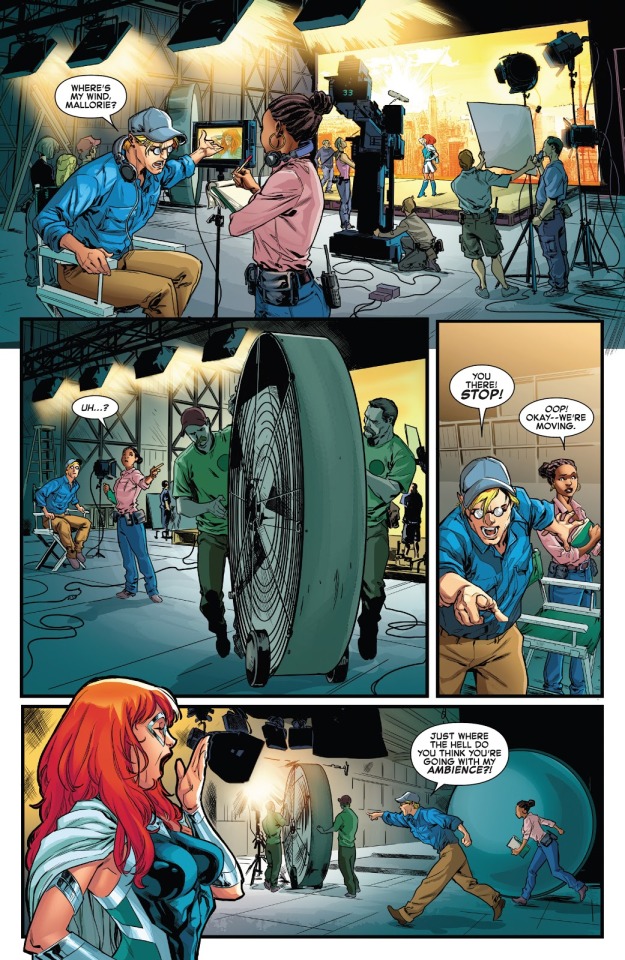
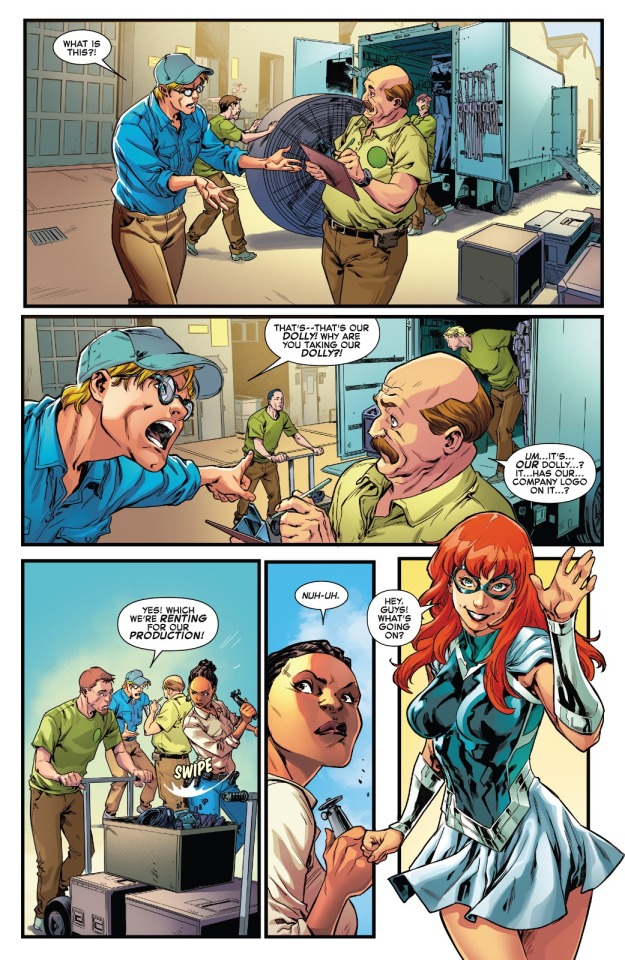
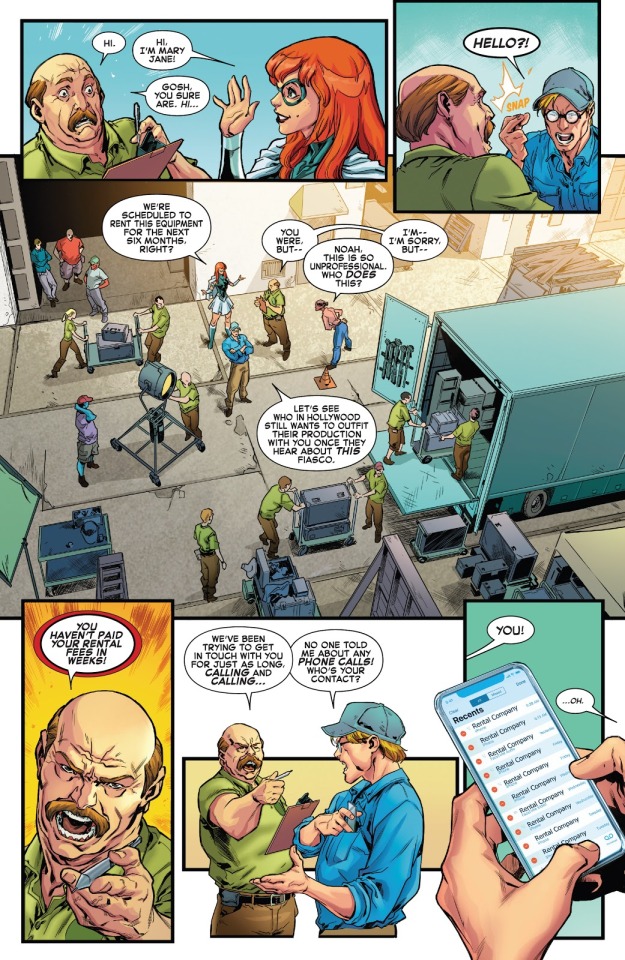
There are a few things to unpack from these pages, most of which further confirms topics we’ve already touched on.
For starters, we could argue Beck’s rudeness and threat exemplifies the danger he poses. Not just because he is a violent man, but also because he is seeking to ruin an innocent man’s business. This is something he could theoretically use McKnight’s reputation to achieve even more effectively.
Admittedly, that’s a little nit-picky.
Beck in Cage’s role here didn’t act unreasonably. He’s a bad person but even a good person could be forgiven or at least understood in this situation.
The real Cage McKnight may well be miffed at his equipment being removed and the lack of professionalism. That wouldn’t necessarily be grounds for Noah’s business to be harmed either if he was genuinely being unprofessional. Not to mention, we could easily give Beck the benefit of the doubt and say his threat was simply a bargaining tactic to get what he wants.
However, what’s less forgivable is Beck’s carelessness.
In the grand scheme of his history, failing to check his phone or pay some bills is hardly his worse crime. But it is endemic of a larger issue. Beck has never made a real movie before, not as the director anyway. The closest he’s ever come are his crimes, which granted would demand certain similar skills. However, he pulled off those crimes with little concern for any henchmen he involved nor any legal or financial obligations. He funded his crimes through other crimes. He viewed his helpers as disposable. And as for breaking the law, that obviously wasn’t going to bother him.
In this story Beck has dozens of people who’s jobs (and possibly their careers) ride on his decisions. The narrative has even painted him as genuinely wanting to help them. And yet he has failed as an incredibly basic responsibility. He hasn’t even considered delegated that task to someone else. It’s exemplary of selfishness at worst, and poor leadership at best.
I’m not trying to argue any of this is out of character for Mysterio. Rather, it’s the implications of this within the status quo that are concerning.
On to of everything else, Mary Jane has decided to go along with Beck’s passion project without considering if he’s even qualified for the job. Creative vision isn’t enough, you need basic competency as well. You need to know how and who to delegate stuff to if it’s not your forte or not what you are interested in.
It’s also further exemplifies the potential damage Beck can bring to the real McKnight’s reputation. If word of this gets out suddenly McKnight at best might be regarded as rude, at worst a poor leader and incompetent. Incompetent with money no less, which (above anything else) is likely to paint him poorly in the eyes of the Hollywood power players.
This misuse of Cage’s reputation continues into the next page where Beck outright throws McKnight’s name around. He claims there has been a mistake because his movie was given a generous budget. Mary Jane tries to calm the situation down and sits in one of the fold out chairs. Her plan is to prevent the men from removing it off the set, a scheme Mallorie (literally) adds some weight to.
In spite of ‘Cage’s’ borderline verbal abuse, Noah expresses respect for Cage and the film project, suggesting he talk to the money people.
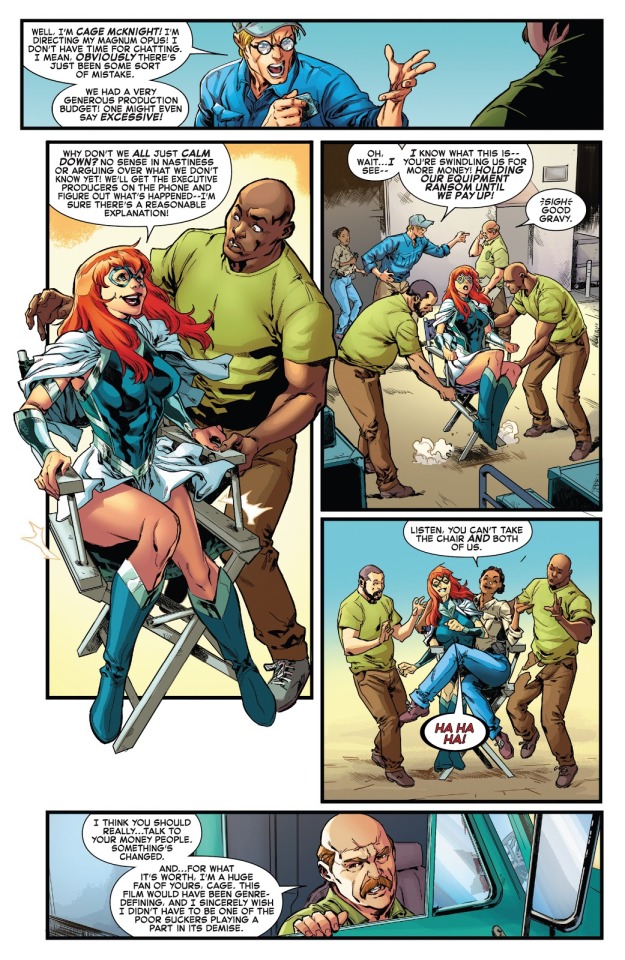
By rights MJ in observing this entire scene should be much more sceptical of Beck. At the very least she should wonder if she’s made the right decision in helping him. SPOILERS: She won’t.
What she does do though, is use her charm/social savvy to defuse situations and keep Mysterio under control. This is clearly part of the direction Williams wants to take the series in. In fact it’s the central conceit of this entire issue.
On this front Williams does a superb job. No seriously, I might hate this status quo. I might loathe the mischaracterization facilitating it. I might despise the contrivance that keeps it going. But it’s stuff like this where Williams once more displays a deftness with MJ’s character.
She understands that Mary Jane possesses superb social skills that can serve as a form of ‘super power’ within certain contexts. Williams has (clumsily) generated one such context and thus allowed MJ to shine. You could genuinely cite or post this scene to exemplify some of the strengths of Mary Jane’s character. If you want a Spider-Man comparison, it’s a little like citing Otto injuring Scorpion from ASM #700 as an example of Peter’s raw power. How we got to that moment was nonsensical but unto itself it is a great example of a singular aspect of the character.
Another example occurs when MJ prompts ‘Cage’ to seek out more money for the film.

This moment demonstrates MJ’s practicality and determination. It’s just a shame that display entails her helping a criminal and suggesting they con yet more people!
The next page is a montage of just that, with Hollywood money people turning them down. ‘Cage’ reacts by angrily flipping tables. In contrast MJ calmly and politely tries to inject some positivity into the meetings.
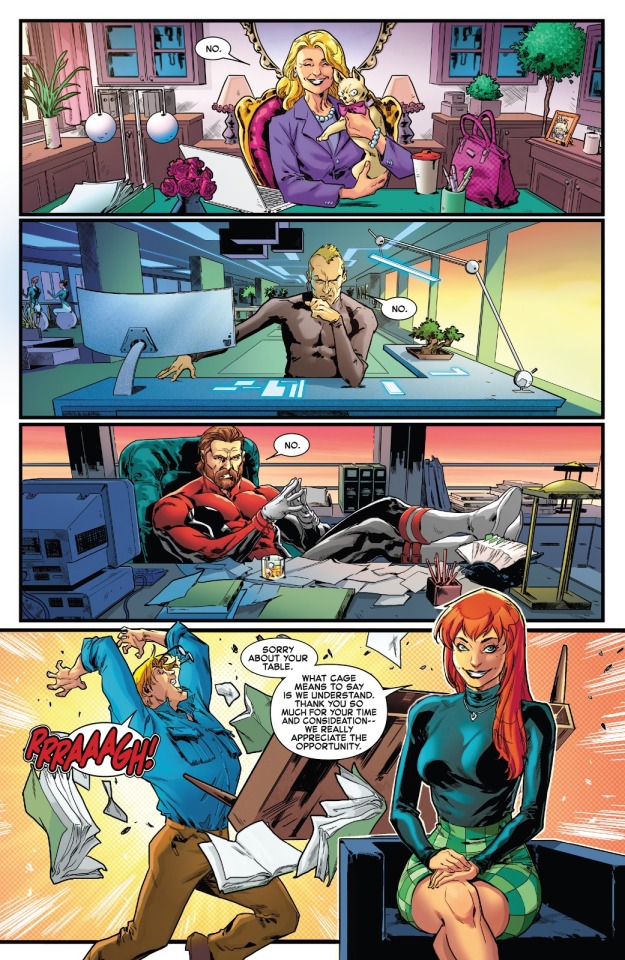
Williams again does a great job of showing MJ’s personality. She keeps in control and is a great people person. She is practical and knows how to help Mysterio get stuff done.
But take note of ‘Cage’s’ misbehaviour in front of the money people. This opens up the possibility of him being dangerous and unstable, therefore a liability if left unchecked. Were this an exception to the rule or extenuating circumstances, that’d perhaps be understandable. But Mysterio, whilst not exactly defined by his rage, is a violent person. He has inflicted physical and mental harm/abuse to people. And his bouts of bad behaviour are likely to negatively impact the real McKnight’s chances of working with any of these people in the future.
I’ll leave it there for now. We’ll pick up where we left off last time.
Previous Part
Next Part
Master Post
#Leah Williams#amazing mary jane#mjwatsonedit#mary jane watson#Mary Jane Watson Parker#MJ Watson#Mysterio#quentin beck#Spider-Man#Savage Six#Vulture#Peter Parker#Carlos Gomez
14 notes
·
View notes
Text
Ghost Spider #2 Thoughts
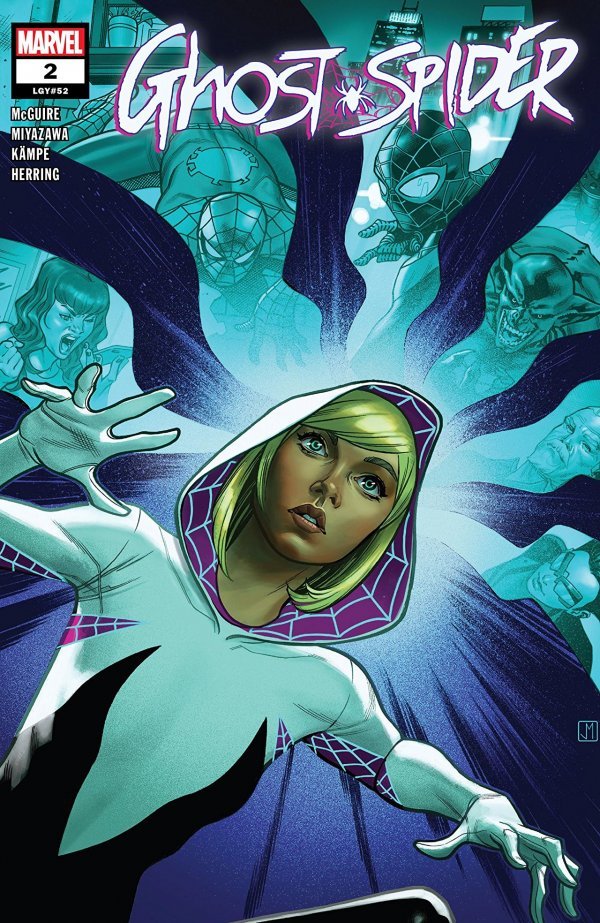
Sigh...more of the same...
This premise gets worse the more you think about it.
I mean let’s talk about the most obvious thing that didn’t occur to me before. So Gwen needs to pick her entry points back and forth from Earth 616 carefully because her powers don’t work immediately after exiting a portal. To this end she chooses a spot she knows will lead to a bill board with poles jutting out she can grab onto before her powers kick in again.
...why not just open a portal on the ground?
Then you have the utter lack of world building.
It’s fair enough to presume that audiences are familiar with the world building of Earth 616. It’s been around for donkey’s years and it’s the basis for just about every media adaptation of Marvel ever, including the movies. Even if it’s far from a 1:1 similarity it is close enough that even comic book virgins can jump in and not be at too much of a loss. That’s particularly true for a Spidey series where the premise is to be relatively normal, the only fantastical elements demanding world building being the spider powers (which everyone on earth is aware of) and the villains, who often speak for themselves or are famous enough that you can presume knowledge from the audience.
But when it comes to alternate universes like Earth 65, which are specifically alternative to Earth 616, you do need to flesh some things out. And so far beyond Gwen is a super hero and not dead, nor is her Dad and Jameson’s son is an evil gangster not much world building going on.
More problematically is the fact that basic questions are never raised nor answered. Gwen says in Earth 65 she’s going to be late for a class in Earth 616. Is time synchronized though between universes? That’s a pretty basic question when dealing with parallel universes. In the Doctor Who episode ‘Rise of the Cybermen’ that question was answered almost immediately upon entry to the parallel Earth of that story, and the series at that time was trying to be baby’s first science fiction!
It’s not an unreasonable question to ask either given how from Spider-Man’s POV Spider-Verse (where he first met Spider-Gwen) was years ago but the first sentence of the recap page of this series states Gwen got her powers mere months ago.
Playing in the same ballpark as the bad world building is the ignoring of established continuity in regards to the Jackal. Now look, I could buy that Warren has gone so far off the deep end that he considers turning Gwen into a furry like him a good idea.
But...doesn’t Warren effectively consider his clones of Gwen as the real thing? Isn’t that the entire reason he cloned Gwen in the first place, why he set up the original clone of Gwen with a clone of himself to in a weird way live out his fantasy?
So why is he obsessed over this new version of Gwen, a version that for all he knows could just be another clone? In fact if you are Miles Warren wouldn’t that be the first thing you presume? It’s not like she has given any genetic samples he can test to confirm if she is a clone or not.
On the other end of this relationship I just realized how asinine it is that no one recognizes Miles Warren, especially at ESU. Sure once upon a time Warren’s identity was secret. Even after his presumed death in the 1970s Clone Saga his identity was a secret. But that all changed in the 1990s Clone Saga when he was arrested and sent to Ravencroft. At that point his identity became public knowledge. There were like SWAT teams after him for god’s sake! And it’s very difficult to believe that ESU, the place where he worked for years and then randomly disappeared from wouldn’t have heard about one of their staff members being a super villain. Especially a super villain who
a) Became a player in gangland activities
b) Was targeted by the Punisher...three times!
c) MURDERED one of their other staff members!
d) Was majorly complicit in an event that turned everyone in New York into spider monsters!
e) Attempted global genocide!
f) Seemingly died very publically
Those last two by the way? They happened on site of the Daily Bugle newspaper!
This isn’t even addressing how he was last seen Marvel Team Up 2019 where he was again arrested at ESU itself! This issue does nothing to explain how he went from that situation to this. Which I’m actually okay with as that was handled by a different editorial office. If you like that was Ms. Marvel continuity and this is Spider continuity.
Normally I’d let the other continuity errors slide but most of them are stories that are major major appearances by the Jackal and define his relationship with Gwen Stacy in the first place, which is the thing this whole arc is built upon.
But no. He changes his last name, and literally nothing else, and he goes unrecognized. Unrecognized in a school where Peter Parker is a teaching assistant (still don’t know when or where that happened)!!!!!!!!!!!!! How on Earth is he going incognito? Does he just make sure to stay 10 paces behind Peter at all times??????? Hell Curt Connors is working there too and he has to know that, he just saw Connors in Clone Conspiracy! In fact GWEN saw him in Clone Conspiracy, she saw multiple clones of him looking just like he did in issue #1 why was she not reacting to that?
My God it gets dumber the more I think about it because in Clone Conspiracy we last saw Warren blowing himself up and that was 100% confirmed to be the real Warren not another clone so who is this guy? Not to mention that story also depicted Warren wearing a Jackal costume not actually transforming into a human jackal monster.
Now me personally I think nowdays the latter idea should be the norm for the character. It never made sense for a middle aged man to get the better of Spider-Man, but his 90s Joker/Matrix look was just terrible. Having him transform back and forth though is a great compromise. But again how did we get here????????????????
It’s all just so poorly thought through!
Going back to what I said last issue about the lack of information given to new readers, this story goes along with that as far as the Man-Wolf is concerned. His treatment very much plays out as the latest issue in a run which would be fine if this was merely Ghost Spider #51-52 as opposed to ALSO being Ghost Spider #1-2. To treat this character who’s affecting subplots the way he is as though readers should just know who he is doesn’t make sense with a major relaunch. We haven’t even SEEN Man-Wolf in this series but we’ve talked a lot about him.
Remember show don’t tell?????????????
The same applies to the ramifications of his actions. He’s responsible for a bomb. What bomb? He almost killed Harry? Who is Harry? Gwen tells some thugs to leave her friends alone but its not until panels later that we confirm they are Man-wolf’s thugs, played initially as it was that wasn’t clear.
All of this is a non-issue if you read the older run but if you haven’t then it’s confusing and alienating.
And unlike what certain people might say it’s beyond unacceptable to demand that readers do homework to enjoy a comic they already paid for.
Lets change things up and talk about the two positives I have. The art continues to be nice, I especially like Benji’s look because it is very reminiscent of Spider-Man Loves Mary Jane! And, as was common back when I was reading Spider-Gwen regularly, George Stacy continues to be the best character in this. The short scene in the kitchen was the best scene of the whole book and was genuinely endearing.
Okay back to the justifiable complaints.
So Gwen comments that she has to be subtle in order to keep her identity on Earth 616...but then towards the end of the book she enters a portal from Earth 65 into Earth 616 unmasked. This is stupid in general but extra stupid considering she knows her powers don’t immediately work upon exiting portals. So even if she wasn’t immediately spotted by someone or a CCTV camera she wouldn’t even have a spider sense to warn her of danger for a few precious seconds! Someone who’s life was upended by her identity being revealed (and was a public enemy before that) would be naturally wary of something like this. This isn’t even accounting for the fact that she knows she DIED in Earth 616 because one lunatic discovered Peter’s identity! Also if she can exits portals on roof tops why does she ever need to risk her neck over at that billboard?
The only other problem I spotted was that the colourist seriously screwed up Peter’s look as he has black hair instead of brown.
Besides all that the inherent problems of the premise from last issue still apply. Peter being a regular character. Gwen endangering her friends on Earth 65. The division between the supporting cast.
Ugh....this is gonna be a slog of a series isn’t it...
#Spider-Man#Spider-Gwen#Ghost Spider#Gwen Stacy#Peter Parker#The Jackal#Jackal#Miles Warren#George Stacy#Captain Stacy#Clone Conspiracy#Curt Connors#Clone Saga#Lizard
13 notes
·
View notes
Text
With Into the Spider-Verse discussions over the role and relevancy of Peter Parker to Spider-Man have been inevitably raised. He idea being that Spider-Man is now and icon, a mantle, a symbol and an ideal applicable to anyone rather than a particular person.
I felt I should throw my two cents in on this.
Basically...yes and no.
Spider-Man is iconic, but he’s iconic because of certain specifics pertaining to Peter Parker.
In essence there isn’t so much a question of if Spider-Man is a person or a mantle now. Spider-Man is both things.
Mayday, Miles, Gwen, Ben Reilly, Kaine, Miguel, etc, all those characters are worthy characters and heroes in their own right who live up to the example and values set by Peter.
But Peter is not an interchangeable part of the mythos.
I think with the advent of characters like Miles people very much felt he was, as though he was akin to Wally West, Barry Allan, Hal Jordan, Kyle Rayner. In that you can if not mix and match elements from him, Miles and whoever else you want then you can swap them in and out of the role of Spider-Man.
Except that’s just not true.
Spider-Man didn’t become popular off the back of a costume and powerset and it wasn’t even just the idea of someone with relatively down to Earth problems. After all Spider-Man himself has remained perennially popular and relevant with mostly just tweaks to update him across 55 years in a sea of characters who also were fantasy protagonists with relatable problems.
So evidently there is something specific to Peter which renders him unique beyond a broad concept, the nuances of his character and story speak to people on a deeper level than just the broad idea.
This makes sense because almost all the silver age Marvel characters were designed from the inside out pretty much, the emphasis upon their personalities and personal lives first and their powers second.
In fact all the Spider-Heroes actively prove my point because it isn’t just that they exist because they are Spider-Themed in their powers or their costumes resemble Spider-Man’s or they look at being relatable people from a different angle.
Almost all of them actively presuppose the audience know about the Peter Parker Spider-Man and to some extent his mythology. As in they are in the text, subtext or in the meta text defined through a comparison and contrast to Peter.
Let’s go down the list.
Spider-Ham: Spider-Man but as a cartoon pig played for Looney Tunes style humour.
The Venom symbiote: Peter’s evil black costume that has better versions of his powers and hates him for rejecting it.
Brock Venom: A villain/anti-hero who’s origin is all about blaming Peter for ruining his career by catching a criminal
Flash Venom: Peter’s scool rival turned friend and Spider-Man’s biggest fan, looking to him as inspiration
Spidey 2099: His origin is all about trying to recreate Peter’s powers because Peter as Spidey was a legendary hero. He is also a scientist like Peter with his family life and personality placed in deliberate subversion of Peter’s. Later he takes greater inspiration from Peter’s legend and one of his biggest foes was literally a villain who looked MORE like classic Spider-Man and another one was literally Spider-Man’s evil costume
Ben Reilly: Literally a clone of Peter Parker, his whole deal is defining himself as an individual against his memories of being Peter
Kaine: Also literally a clone of Peter, his whole deal is being at first what Peter might’ve been if he suffered to the nth degree and later trying to live up to Peter and Peter’s clone’s heroic example, whilst also being a subversion of what you’d expect out of Spider-Man. the tagline for his solo seires was literally a subversion of Spider-Man’s famous motto.
Spider-Girl/Mayday: Her entire character revolves around being the daughter of Peter Parker. And her costume is the one worn by Peter Parker’s clone!
Spider Woman/Mattie Franklin: A Spider-Man fangirl who got powers through an encounter with Spider-Man’s most infamous villain and who began her hero career impersonating Spider-Man before adopting a costume clearly modelled after his. Need I say more?
Spider-Man Noir: Peter Parker if he lived in the 1930s
Miles Morales: Not only is comic book Miles himself quite derivative of Peter anyway, really his concept revolves around being the inheritor of a dead Peter Parker’s legacy and could arguably be described as ‘Spider-Man but if he was a teenage poc in the modern day and also he had 2 living parents’
Silk: A woman who has almost identical powers to Peter Parker because she was bitten by the same spider he was seconds after him, was taken in by one of his old mentors/enemies and debuted as part of a subplot revolving around her inherent magical connection to him.
Spider-Gwen: Whether you go by her comic book self, her TV self or her movie self, her character is again innately linked in with Peter’s. She’s either Peter’s school peer and teammate, his best friend inspired to heroism by his death, or both. And all of those come with some level of expectation that you know Gwen Stacy was Spider-Man’s dead girlfriend. Her origin story and debut in fact hinges upon that role reversal and the presumption the audience are aware of that reversal.
Peni Parker: Peter Parker if he was a teenage girl protagonist of a mech anime story.
See what I mean, Peter Parker and his status as Spider-Man, and your knowledge of him being Spider-Man, is inherent to every single one of those characters.
The only characters for whom that isn’t the case are Jessica Drew, Julia Carpenter and Anya Corazon. MAYBE if you tweaked Mattie’s backstory you could remove Peter’s presence from it but even if you did that’s still just 4 characters who don’t have a built in storytelling reliance upon Peter Parker as a major element to their backstories and/or reliance upon audience familiarity with the Peter Parker Spider-Man.
And noticeably...they were less successful than most of the above mentioned characters. Further proving my point that is is very specifically Peter Parker and his story that defines who and what Spider-Man is.
So...no Peter isn’t interchangeable, or one of many.
Peter IS Spider-Man.
Peter is THE Spider-Man in the grander scheme of things.
But just because Miles, or Mayday, or Gwen or Ben or Miguel or whoever aren’t that, doesn’t make them bad characters, unworthy characters or characters who deserve to stick around and have stories told of them.
They’re still worthy of the mantle of Spider-Man in-universe and worthy of being inspiring to readers unto themselves.
It’s just that their existence doesn’t evolve being Spider-Man into just this broad concept wherein Peter is merely one of many.
#Spider-Man#Spider-Man: Into the SPider-Verse#Peter Parker#Miles Morales#Venom#Venom symbiote#Flash Thompson#eddie brock#spider woman#mayday parker#spider-girl#arana#Anya Corazon#Jessica Drew#Julia Carpenter#Mattie Franklin#silk#Cindy Moon#Gwen Stacy#Spider-Gwen#Spider-Man 2099#Miguel O'Hara#Spider-Ham#Spider-Man Noir#Peni Parker#sp//dr#Ben Reilly#Kaine#Kaine Parker#Scarlet Spider
251 notes
·
View notes
Text
I saw recently an argument about how irresponsible or selfish Peter Parker was in planning on marrying not one, but two women without divulging his secret identity to them.
The first was Gwen Stacy in the Silver Age and the second was Mary Jane Watson in the Bronze Age.
Thinking about it though...this is a little bit more complicated than that.
In ASM #30 Peter learns his romantic rival Ned Leeds has proposed to Betty Brant. Shocked by this news the young and impulsive Peter decides himself to propose to Betty...but also makes it clear to the readers he will first reveal his secret to her.
Stupid? Yes.
But it shows Peter even at a younger age had an awareness that he couldn’t be married and maintain his secret from his spouse.
It goes badly though. Before Peter gets round to the big reveal, Betty makes it clear she couldn’t handle being with anyone who takes risks like Spidey.
When presented the options of a future with Betty or continuing being Spider-Man, Peter chooses the latter.
Much later in issue #100 Peter again contemplates marriage, this time to Gwen Stacy. Here he does consider how difficult it would be to maintain his secret whilst being married to Gwen, the latter of which he has set his mind to.
Again...he’s young and dumb here for even considering that, but noticeably his conclusion is to simply remove his powers, thus ending his career and being free to pursue life with Gwen.
Inconsistent? Out of character? At face value when compared to ASM #100 certainly so. But context is key. Peter is older, arguably more weary of life as a crime fighter, can more clearly see a future for himself and most importantly is much more deeply in love with Gwen than Betty.
Betty was his first girlfriend but not the first woman he was ever in love with, that was Gwen and they mutually shared a desire for a future together; regardless of how unlikely we the readers could tell that would be. Equally important is the fact that Gwen despises Spider-Man for her father’s death and doesn’t seem likely to budge from that mindset one inch.
So whilst Peter did consider marrying Gwen without telling her his secret, that only happened for a short period of time when he was young and naive (as were all younger members of the cast). It was not long before he started to make proactive moves towards marrying her that he made the reasonable decision to simply cease being Spider-Man and therefore largely mitigate the need to divulge his secret. Of course even if he was powerless there were still strong reasons he should have told her, but again...he was young and dumb. The prospects of someone uncovering his identity even after he retired or the potential question of his genetics if they ever wanted to have children wasn’t something he at the time may have considered. Not out of selfishness but mere naivete. More than this both things could’ve been addressed without him actually telling her his secret. He could’ve informed her he had a genetic disorder of some kind or that his association with Spider-Man meant Gwen was undertaking a major risk. Not that she wasn’t already, her father’s status already endangered her.
So finally we get to MJ. When Peter propsed to MJ it was due to a lot of factors in his life driving him to do so. It seems to me like he was proposing more because he felt he should, because he felt he should get married as opposed to he wanted desperately to spend the rest of his life with MJ specifically. I’m not saying he did not love her, but that their relationship (even outside of the Spider-Man angle) wasn’t ‘there’ yet.
What is noticeable about Peter’s proposal in ASM #182, and his thoughts on it in ASM #183, is that the issue of MJ not knowing his secret isn’t that big of a deal. IIRC...he never once talks about either maintaining it a secret from her nor possibly revealing it to her.
On the one hand this could be interpreted as a sign that Peter is in truth not really ready for marriage, that he’s doing it for the idea of stability and growth he believes it will provide, not because he actually wants to spend his life with her.
On the other hand, because the topic isn’t really talked about one way or the other it’s not really fair to condemn Peter for intending to marry MJ without divulging his secret. That aspect of the story is so badly written that we have no idea as to what Peter was considering doing in regards to that topic, if he considering it at all. Its fair to presume that because he gave no indication he was going to reveal the truth to MJ that in fact his plan was to continue lying to her.
But it’s equally fair to presume that because he gave no indication he may well have been planning on, or just eventually have considered, telling her if she said yes. Indeed given how he wanted to reveal the truth to Betty and resolved to simply retire to marry Gwen whom he believed could never accept him as Spidey, it’s entirely logical that Peter was going to tell MJ. Like Betty when he decided to propose there was no Spidey shaped roadblock to their future together and there is no hint of him considering retirement as a crime fighter.
Like I said...it’s badly written. And I don’t just mean because we get no hint of this thought process. I mean it’s badly written because Peter would 100% have considered that question, have considered retirement to be with MJ, or telling her the truth. Again he only briefly considered marrying Gwen and continuing to lie to her before finding an alternate solution. When he had the chance to be with Black Cat (with pie in the sky plans of marriage to her someday) he did reveal who he was.
The idea that an older, wiser Peter would honestly seriously entertain marriage (to the point of literally proposing) and lying to his wife is patently ridiculous and out of character.
It is not the only aspect of the story that criticism could apply to though.
Author Marv Wolfman has described himself pompously as a Spidey ‘purist’, which translates to following what he regards as Ditko’s intentions. This is why he placed Peter in Grad School. According to him Ditko felt Peter leaving Midtwon High was a mistake, that he should have perennial been stuck there and so placing him in Grad School was the next best thing.
Noticably under Wolfman’s pen, even early on, Peter seems to have regressed as a character emotionally. He’s comparatively more hotheaded and immature than he’d been in the preceding years, much more hung up on Aunt May and also just...kind of stupid. He bursts into a hospital full of fragile older people whilst in costume, including his aunt May who’s prone to heart problems. This in turn causes her to go to the critical ward.
In the same issue MJ rejects Peter’s proposal. Now this wasn’t necessarily out of character for MJ. Even her rationale of basically wanting to see other people wasn’t nonsensical. The problem was the casualness and demeanor with which MJ treated the situation. She treats Peter’s proposal as a mere afterthought. She quickly and casually drops the ring back into his hand, pecks him on the cheek, smiles and walks out the door saying they could still be friends.
With the benefit of retcons this scene both makes sense and is incredibly enriching to MJ’s character. But in the context of when it was written and released...it makes no fucking sense.
This is not how someone with MJ’s established character, as it had developed and shared a history with Peter, would’ve acted in that situation. It was as though Wolfman had decided pseudo-Ditko era Peter was in a relationship with pseudo-Ditko era Mary Jane and sought to rectify that ASAP. Gone was their character development and relationship of 6+ years!
Matters were not helped by Peter’s casualness and relative nonchalance over MJ’s rejection. He’s bummed out but takes it more with a shrug than anything else, quickly considering rekindling his relationship with Betty Brant when she shows up in his apartment that same day. Granted between May’s condition and other factors in his life it’s not unreasonable that Peter would act that way, but you look at it in context of everything else and how we know Wolfman thought of his run and the character and it becomes obvious.
Wolfman was just writing the characters at odds with their defined characterizations.
And as such the argument that Peter was planning on marrying MJ but continuing to lie to her holds little stock. It was just another one of Wolfman’s characterization misfires.
#Spider-Man#Peter Parker#Gwen Stacy#Betty Brant#mjwatsonedit#Mary jane watson Parker#Mary Jane Watson#mj watson#Marv Wolfman
27 notes
·
View notes
Note
Has peter ever thought that the best way to protect everyone he loves is to not be involved with them? I know that there was a very brief time when he ditched the peter Parker part of his life, but I would think after what happened to Gwen he would consider a life alone without anyone so that no one would be endangered by him. For example he wouldn’t try and date because that would put them in danger. Or some line of thinking similar to that.
Ah well this is a dicey topic.
Peter has at times THOUGHT this but never really acted upon it, he’s never isolated himself for the greater good.
After Gwen died he does in the immediate wake of it (and I mean literally cradling her body seconds after she died) think he was responsible for killing her.
So you’d think he would consider isolation but he never did and eventually he and MJ are dating and the thought doesn’t cross his mind. in fact in the first issue where they are a couple she almost dies because Harry as the Goblin bombed Peter’s apartment. Due to the stress and injuries he even hallucinates seeing an injured MJ as Gwen.
So you’d think this would have crossed his mind but it didn’t.
And in fact no matter how many passing thoughts or self-flagellating monologues he has considering how everyone would be safer without him, he has never actually done that.*
Thus the question arises...why didn’t he ever do this and why was he so casual, especially after Gwen’s death, about dating again?
There are numerous ways to reconcile it.
a) Old fashioned writing, plain and simple. 1973-1975 was a different time
b) Between Gwen’s death in 1973 and the end of Conway’s run in 1975 he actually had stories play out in semi-real time. Roughly 2 years elapsed for Peter as it did for the readers. I dunno if there has ever been an explanation for why this happened but I suspect it was so that Conway could have Peter believably move on.
In real life when you lose a loved one the first 2 years are the hardest and when people lose a partner they often wait 1-2 years before moving on. So 2 years passing for Peter was realistic and respectful. However by having those 2 years play out in semi-real time Conway was having rather large time skips between issues and arcs.
Whereas under Stan’s pen Peter’s college adventures more often than not happened in short succession of one another (sometimes flowing directly from one into the next leaving no gaps) suddenly it was like the Ditko era where an undisclosed amount of time was happening off panel between stories. This is why we never actually SEE the exact moment Peter and MJ start dating. The build up is there, we know they have feelings so it works, but we open up ASM #136 and bam they are dating now.**
Conway likely played things like this because going at the old pace meant you’d either need to wait 4-8 years before 1-2 years had elapsed for Peter, or you waited less time and in-universe Peter seems to be dating whilst Gwen’s body is still warm so to speak.
He made the right decision but the consequence was if Peter ever did have apprehensions of endangering any future lovers like Gwen we didn’t see it, but it might’ve happened off panel.
c) When one thinks about it, not only does anyone living in Marvel NYC already court death because of all the crime and super people (it was ground zero for Galactus’ invasion!) but Peter’s lifestyle had come to endanger loved ones long before Gwen died.
Betty Brant was abducted by Doc Ock in ASM #12 and Annual #1, for no reason other than Otto noticed Spidey risked his life to save her before so he’d do so again probably. In the latter story Aunt May got abducted to because she happened to be visiting the Bugle at that same moment. The Sinister Six didn’t even know of her connection to Peter.
Peter himself has been targeted merely because people know he takes Spidey photos.
So whilst no one had directly died before due to being a part of his life, he’d been aware of the potential risks for a long time.
But it goes deeper than that because he was also no stranger to death. He’d seen people die in the course of his career, most poignantly Captain Stacy. His death had nothing to do with his connection to Peter Parker.
So Peter knew these risks. Heck in ASM #40 he even thought that he was not himself afraid to die, being more concerned with what would happen to Aunt May if he disappeared without a trace. He knew of how delicate she was so in risking his life as Spider-Man he was in effect risking her life too not even directly from villains but indirectly because his death could in turn cause her’s.
However there had been countless examples in his life where people he knew got endangered by pure chance. Captain Stacy got brainwashed and he an Gwen almost died due to a scheme by Kingpin that had nothing to do with Peter Parker or Spider-Man.
Basically...shit happens and Peter knew that.
d) Really Spider-Man’s chosen career path isn’t that different to a cop’s, an activist’s a secret service person. The difference is the physical threat his enemies pose is greater but the physical threat he poses is also greater and he has greater anonymity than those people.
Peter of course was friendly with people who’s careers expose them to potential enemies. Jameson, Robbie, Captain Stacy, even the Osborn’s in a sense. But they all had families too.
Prison officers, cops and the like in the real world do as well even though if a someone with a vendetta or someone deranged is clever and resourcful enough there is sadly not that much to stop them targetting their loved ones either.
So...is Spider-Man really that different?
Why are those people, who arguably have less protection than he does, allowed to have families but he isn’t?
e) Peter needs people.
I mean we all need people, no one is an island. But when you live a life like Peter’s a support network is vital. It’s especially vital when you are grieving as he was after Gwen died.
It’s part of simply maintaining your health and sanity
f) Were Peter to have isolated himself in effect he kind of exposes his friends to more danger. If he’s still Spider-Man and someone finds out who he is then the fact that he isn’t currently in contact with his friends or family means little, they are still targets and he would still be in a better position to protect them if he was in regular contact with them and knew vaguely where they were and what they were up to.
Imagine if he isolated himself for 5 years and then someone finds out who he is and decides to target MJ who is now living in California. Warning her or getting to her in time would be much more difficult.
They’re already in danger now, might as well be in the best defensive position possible.
Ultimately it all boils down to this. Peter lost a lover violently due to his lifestyle and then continued that lifestyle and found a new lover without questioning giving up said lifestyle or the possibility of having a lover again. So your options for what that means boils down to
1) He’s a selfish, insensitive, irresponsible, immature jerk.
2) He’s someone who deep down recognizes that in life shit happens and there are risks that come with his job, a job he does for the greater good. But he has human needs and even a responsibility to himself to try to be happy. He can even recognize the paralleles in his job to others who do maintain social connections and knows he’s allowed to have that too.
Option 2 might not have been put on the page of any comic per se, but unlike Option 1, it doesn’t totally eviscerate the central message of the character or the idea he is supposed to be heroic and admirable. Option 2 also makes him capable of better reflecting the average reader
*Even abandonning his identity as Peter Parker wasn’t so much to keep everyone else safe as it was a coping mechanism for his own pain and grief. Peter’s life was full of pain and loss, so giving it up and retreating into Spider-Man was ‘safer’.
**In fairness Bendis did the same thing. In USM #1-13 he clearly shows Peter and MJ have feelings for one another but abruptly during the next arc we find out they got together formally off panel and the implication is that we didn’t even see their first kiss or anything.
10 notes
·
View notes
Text
The Vindication of Venom Part 4: Spider Stalker

Part 3
Part 5
I appreciate that I might have come off as rather audacious or condescending (or both) the last part when I basically said most readers were judging Venom in ASM #300 by an unfair set of criteria.
Allow me to defend my view by elaborating further on what the actual intentions behind Venom were.
As I discussed in Part 1, Michelinie’s conception of Venom stemmed primarily from wishing to find an opponent for Spider-Man who was invisible to his Spider Sense. This was emphasized in Venom’s first two off panel appearances where Peter makes note of the lack of warning from his spider sense.



Obviously not having any warning from his spider sense would make Michelinie’s new villain dangerous in a fight, but in these two appearances he’s chosen to build Venom up as an unseen assailant to Peter Parker, not Spider-Man. In the latter instance the assailant even targeted Peter when he was using his powers but was out of costume.
As far as establishing this mysterious individual as a threat this was an ingenious move as it killed three birds with one stone.
By having Peter attacked in his civilian identity it undermined two essential functions of spider sense. Namely that it protects Peter physically but also that he can rely upon it to help him keep his identity a secret. And with these attacks (especially the second one) it is all but confirmed that whoever this assailant is, they are aware of Peter’s double life.
Immediately any reader pondering Peter’s attacker would realize the severity of the danger Spidey was in. He’s under threat from an unknown enemy who knows who he is, possibly knows how to track him down and his usually reliable spider sense can give him no warning as to the assailant’s presence or hostile actions.
These early hints of Venom convey him as insidious and creepy as opposed to a brute force powerhouse. And of course when you think about it, portraying Venom this way early on is the most obvious idea in the world when you villain’s central gimmick (and original source of inspiration) is that they are invisible to Spidey’s in-built danger alarm. In fact such a thing had already been done in the classic ASM #39 where the Green Goblin followed Peter Parker after disabling his spider sense through a chemical.
And this all brings me to my essential point. Despite media and later renditions to the contrary, originally Venom was never intended as a ‘dark reflection of Spider-Man’, at least that wasn’t the main idea. He was also not intended as a villain with a significant link to Peter’s life.
No the key to understanding Venom’s concept is that he was in fact…a stalker. More specifically he’s the equivalent of a celebrity stalker, Spidey being the celebrity in question.
Actually there is even more to it than that which dives into Brock’s psychology, but I’ll address that (along with the ‘celebrity’ aspect of things) in later instalments. For now allow me to focus upon the former rather than the latter.
When I say Venom was a stalker I do not merely mean that he literally stalked Spider-Man. After all the Green Goblin, Harry Osborn, the Puma, Kraven the Hunter and even Mac Gargan (before he became the Scorpion) all did that.
What I mean is unlike those other characters Venom was built around the idea of him being a stalker. And not in an ‘urban hunter’ way like Puma or Kraven where the characters are understood to be an animalistic men, or else see some form of honour in their hunt.
I mean Venom in his early hints and appearances is through the artwork and his actions coded as the types of creepy stalkers you hear about in the news. The people who in our cultural stereotypes of them are heavy breathing, binocular owning, photo taking, peeping around corners and keeping to the shadows weirdos.
Whilst Venom doesn’t directly conform to that described stereotype his actions and portrayals clearly code him as such to the readers of the time.
Just take another look at Web #18 and #24. It can all too easily be read as touching upon ideas you’d find in a stalker storyline, especially since (ala Web #24) this assailant is apparently following Peter and striking from the shadows only to disappear again.
Cut to ASM #298 and we get a wall of Spider-Man pictures and news clippings in what looks like a grim little apartment that Venom. Clad in shadows is musing over.

Again this is obviously shorthand for classic stalker behaviour. This is emphasised further in ASM #299 where Venom is fully unveiled and the scene is played to sell creepiness and terror. The latter aspect is further emphasised through the use of Mary Jane, an innocent and unarmed woman who’s being accosted in the ‘safe space’ of her and our hero’s home.


The scene (specifically in having a defenceless woman confronted by a horrible ‘monster’) is at least somewhat reminiscent of many slasher movies which had a certain degree of popularity at the time, or many horror or even noir films. Whatever you think about the appropriateness of using Mary Jane in this way the point is that the scene is being played to be unsettlingly creepy and scary.
Whilst lacking his frightening costume and creepy grin, ASM #300 itself even features a scene showcasing Brock stalking Peter.


The idea of Venom following an unsuspecting Spider-Man and invading his private life is furthermore played up in consequent Venom stories, and even in the character’s debut episode in the first season of Spider-Man the animated series.


















In fact the idea has even evoked in stories published long after Michelinie’s departure.

Michelinie additionally used stalkers repeatedly in his run on Spider-Man albeit, ones targeting Mary Jane rather than Spider-Man, indicating the idea of a stalker villain held an appeal to him. Forgive me for repeating this image again, but compare this image from ASM #298 with this other one from ASM #307.


Personally I find the latter creepier (especially considering he has some of Mary Jane’s clothing...)
In addition to being coded as a stalker Brock is also (rightly or wrongly) coded as a ‘religious lunatic’

I will be addressing this more later in the Appendix but it is important to bear in mind that in the time period this sort of coding was shorthand for a disturbed individual, thus complimenting the stalker coding of the character.
The time period in question by the way was the mid-late 1980s. It was an era when comic books had been getting edgier for quite awhile and Spidey was no exception (e.g. the Death of Jean DeWolff arc). So having a villain be something more sinister and insidious like a stalker (rather than a common thug or costumed criminal) would’ve fit with the times. And as far as original concepts were concerned, it was an idea that had not been done to death within Spider-Man’s series at that point in time.
This then addresses one of the most frequent criticisms surrounding Venom’s origins.
· Other versions of the character (such as Spider-Man the Animated Series, Spider-Man 3 and the Spectacular Spider-Man Animated Series) all make Brock to be a much better dark reflection of Spider-Man than the original comic book version
Yes, those versions in many ways present Venom as a much better darker reflection of Spider-Man. Yes the original comic book version perhaps doesn’t sell the idea of Venom as a dark reflection all that effectively.
But like I said earlier, it simply was never the original (or at least primary) point of the character.
The symbiote was used as part of Venom’s character because Michelinie wanted a villain who was invisible to the spider sense, which was an already established power of the symbiote. He then opted to use the established concept rather than invent something new whole cloth.
The fact that it had also been established as capable of granting the host additional powers like Spider-Man and came with an established visual was incidental. Nevertheless (as I discussed above) those facts fed into inadvertently building fan expectations up for something that Michelinie et al didn’t intend for.
When we understand Venom to be a stalker character a lot of his early presentation makes a bit more sense, and feeds into further understanding the other oft criticized aspects of his character.
With that in mind let’s begin to address those.
P.S. I recognize that older comics perhaps did not imply the wearer of the alien costume would get all of Spider-Man’s powers.
That might have been a deliberate embellishment by Michelinie.
However I maintain it wasn’t something done as part os a central idea of Venom as a ‘dark reflection’. Rather it was simply done to allow Venom to pose a tangible threat to Spider-Man.
After all being able to find Spider-Man wherever he was and not trigger the spider sense wouldn’t be particularly threatening if Spidey could simply use his speed to evade his assailant or his strength to easily overpower them. By giving Venom strength as well as speed similar to Spider-Man’s Michelinie allowed his villain to physically challenge our hero on a more equal footing and make him (and us) sweat over every attack.
Part 3
Part 5
#Venom#venom symbiote#symbiote#eddie brock#David Michelinie#Spider-Man#Peter Parker#the spectacular spider-man animated series#greg weisman#marvel#marvel comics#marvel animation#The Vindication of Venom
22 notes
·
View notes
Text
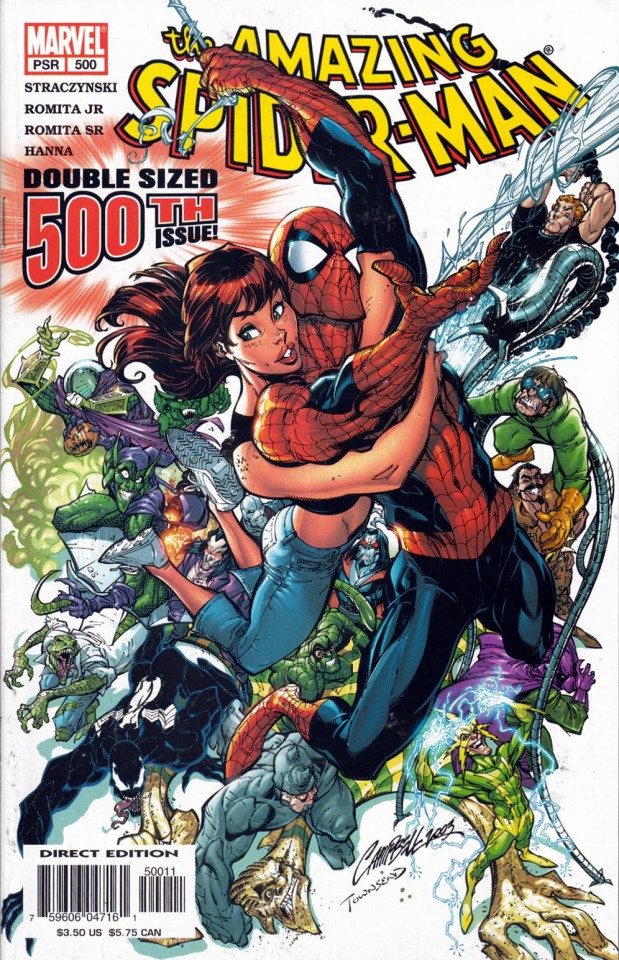
Once upon a time a certain big name within the Spider-Man fandom spoke upon issue #500 and how it wasn’t a good issue, specifically talking about the ending involving Uncle Ben and how it was ‘banal’.
This is my rebuttal to that.
First lets look at the scene in question and give a little context. It’s Spider-Man’s birthday and he’s spent his time on a trip through his life.
He’s seen a possible future where his identity has been compromised, where he’s wanted by the law and where he is ultimately killed in a last stand with the authorities. Then he’s witnessed his origin as a teenager and had to essentially sporadically hop to random points along his timeline in order to get back to where he started and avert a demonic invasion.
In typical Spider-Man fashion the moments of his life he finds himself returning to are far from pleasant ones as he finds himself in the midst of his battles with various foes, or trapped under machinery in Doc Ock’s underwater base, or even at the Brooklyn Bridge trying and again failing to save Gwen Stacy.
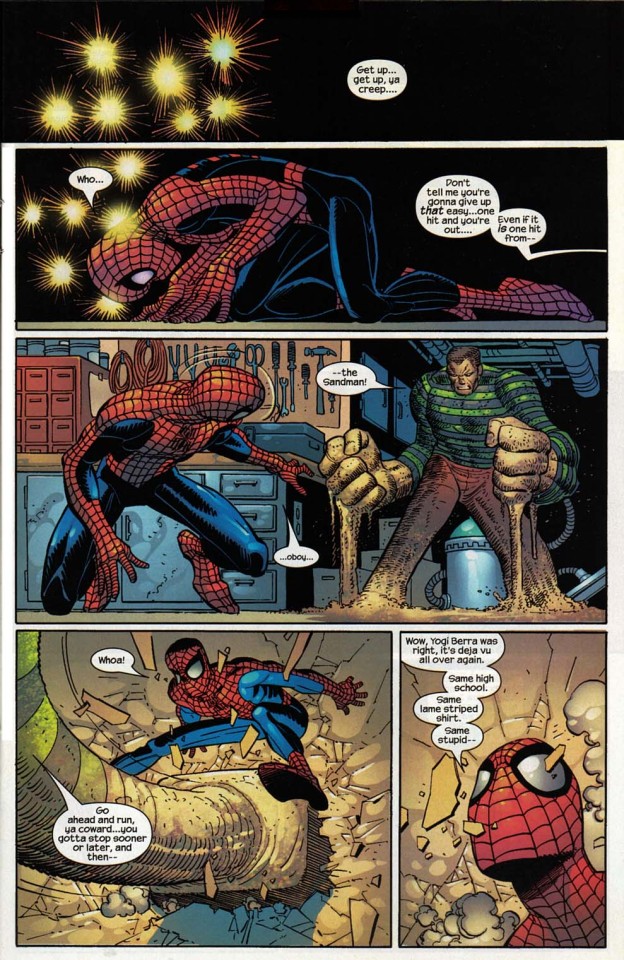
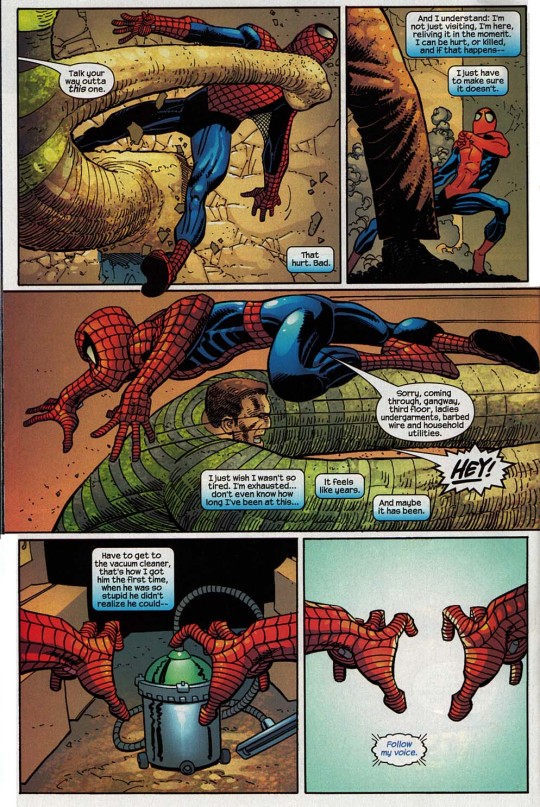




All of this is courtesy of Doctor Strange who inspires Spider-Man to keep on fighting after the latter incident.
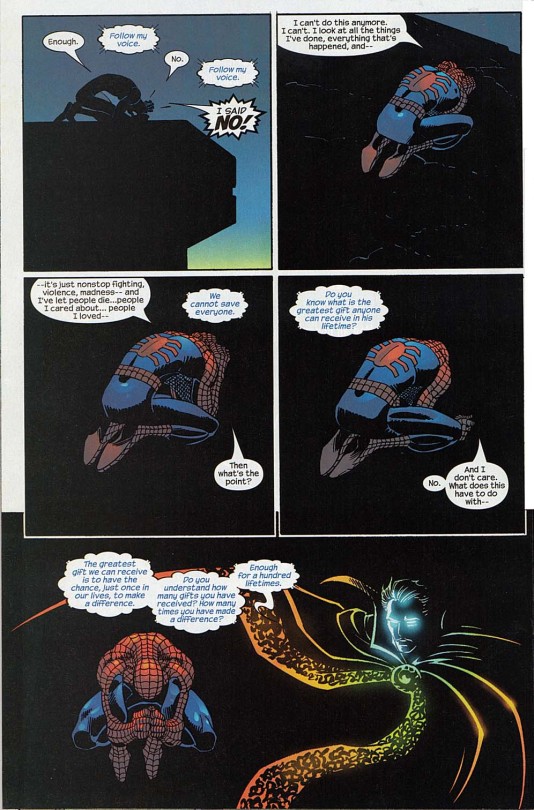

And when I say he has to keep fighting...I mean he has to do all of this:
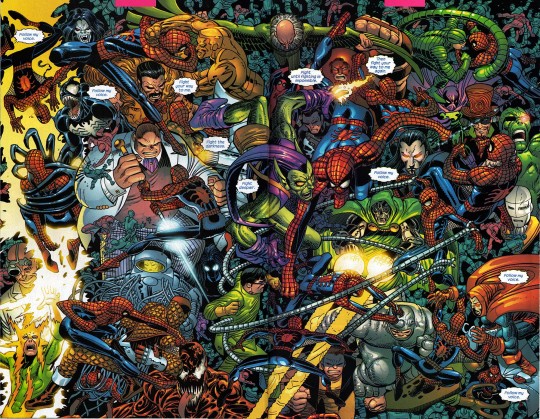
Bad ass.
Anyway by the end of the issue Spider-Man opens up a box from Doctor Strange with a note saying he has just five minutes. And its a doozy!

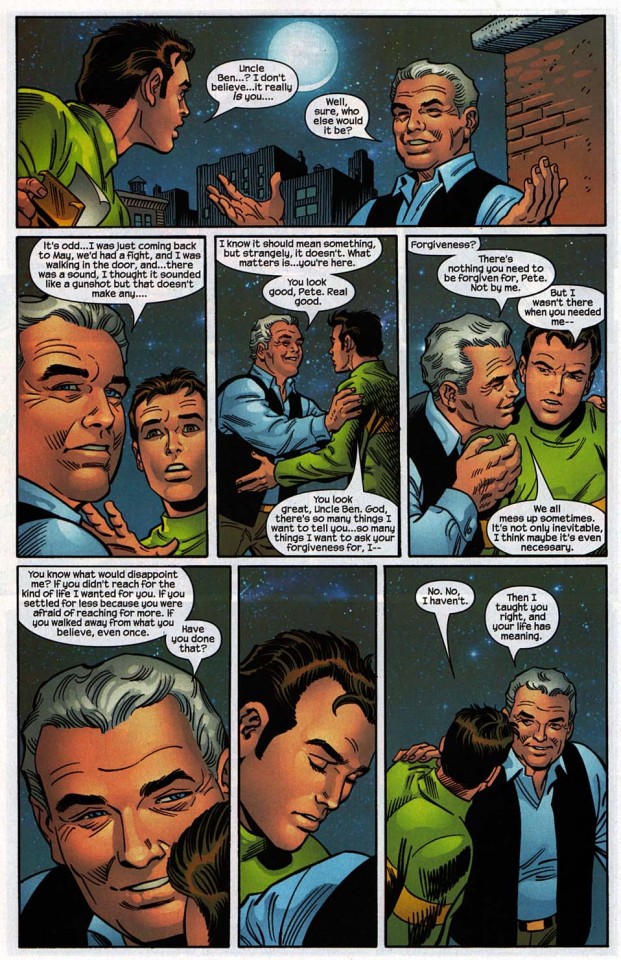

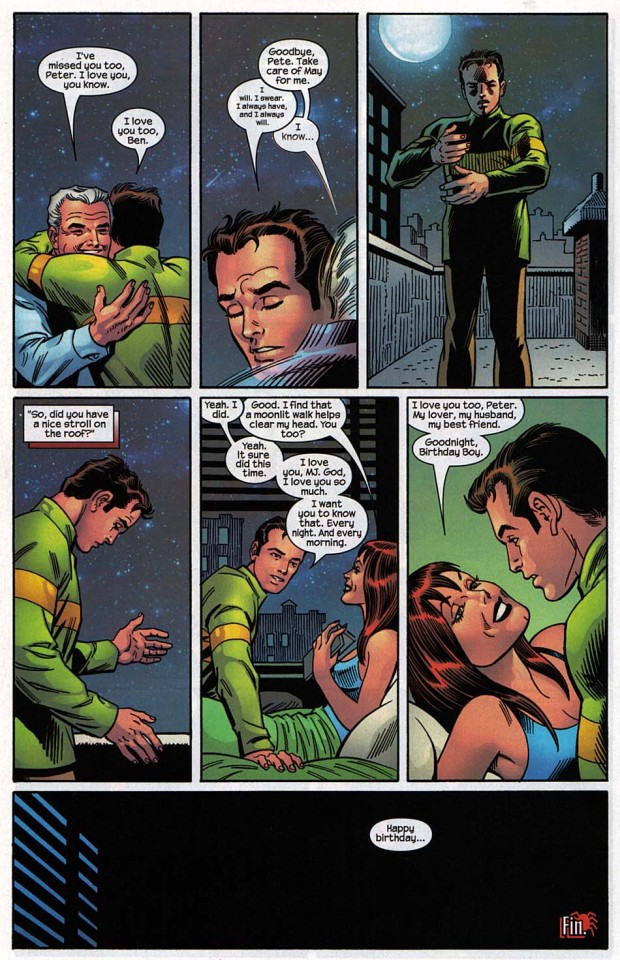
Okay so the main points of contention from this particular Spider-Man fan, when commenting on this issue, boiled down to:
1) This was underwhelming for a 500th issue of a historic title, with ASM #600 being better on that front
2) It’s almost like another Doctor Strange story because Spider-Man is up against Dormammu and Doctor Strange is involved
3) You expect a big ass battle, perhaps with all of his villains as the cover depicted
4) You never feel like its a personal enough story for Spider-Man because its cluttered with other stuff
5) The conversation between Peter and Uncle Ben is banal and says nothing of importance, not addressing Peter’s role in Ben’s death. Particularly this Spider-Man fan notes how if his father was alive again their conversation would be a lot more substantial.
So let’s address these criticisms one by one.
1) This was underwhelming for a 500th issue of a historic title.
I don’t entirely disagree with this.
For a $3.50 comic book in 2004 that was almost (despite the cover’s claim to the contrary) double length the story was mostly just a clipshow. For an issue which is a milestone amongst milestones (being halfway to issue #1000) something more seismic should’ve been in order. As was though the issue was something of a clipshow comic book which isn’t really acceptable when you consider other centennial Spider-Man issues have had stuff like a rematch between Spidey and the Burglar, the death of Harry Osborn, the death of Aunt May or even in ASM #700’s case a big status quo shift. Okay it was shifting into a bad status quo but that’s not my point.
My point is a centennial issue should carry weight to it. it should either be the culmination of something or the beginning of something that’d matter going forward. ASM #500 was the end of a three issue arc that had only one consequence thereafter, the setting up of another short arc involving Loki. Really the story was fairly skippable which for a centennial issue isn’t good enough.
However that being said the story should be evaluated unto itself and not just on the basis of how it marks a milestone.
2) It’s almost like another Doctor Strange story because Spider-Man is up against Dormammu and Doctor Strange is involved
Arguably, this point might be true of the three part story overall. However it is not true of ASM #500 in isolation.
Yes the main impetus is to stop Dormammu and yes Doctor Strange is involved and the one sending Spider-Man on his journey down memory lane.
However they are nothing more than the excuses to get the story going. The story being a highlighting of Spider-Man’s struggles, the cost of the costume and how Peter feels about that at the end of the day.
That’s what the story is really about and it’s not only squarely based on Peter but it is also most definitely by it’s introspective nature a Spider-Man story.
Really Dormammu and Doctor Strange could’ve been switched out for Doctor Doom and Reed Richards and it would’ve amounted to the same thing. Stopping Dormammu is the destination Doctor Strange is the vehicle getting us to that destination but the story is about the guy in that vehicle and his journey to reach that destination and what he feels about the journey once it is over.
3) You expect a big ass battle, perhaps with all of his villains as the cover depicted
We got that. See the splash page above. More poignantly seeing Spider-Man be thrown into all of his old battles at random with little respite and endlessly fight and fight and fight some more, triumphing over each of them and getting back home to help save the whole damn world is a pretty big feat of Spider-Man’s strength and willpower. It’s yet another ‘lift the wreckage off your back’ moment but done differently.
4) You never feel like its a personal enough story for Spider-Man because its cluttered with other stuff
See my rebuttal to point 2) and also take another look at those conversations I posted between Peter and Doctor Strange and Peter and Uncle Ben, not to mention these scenes.
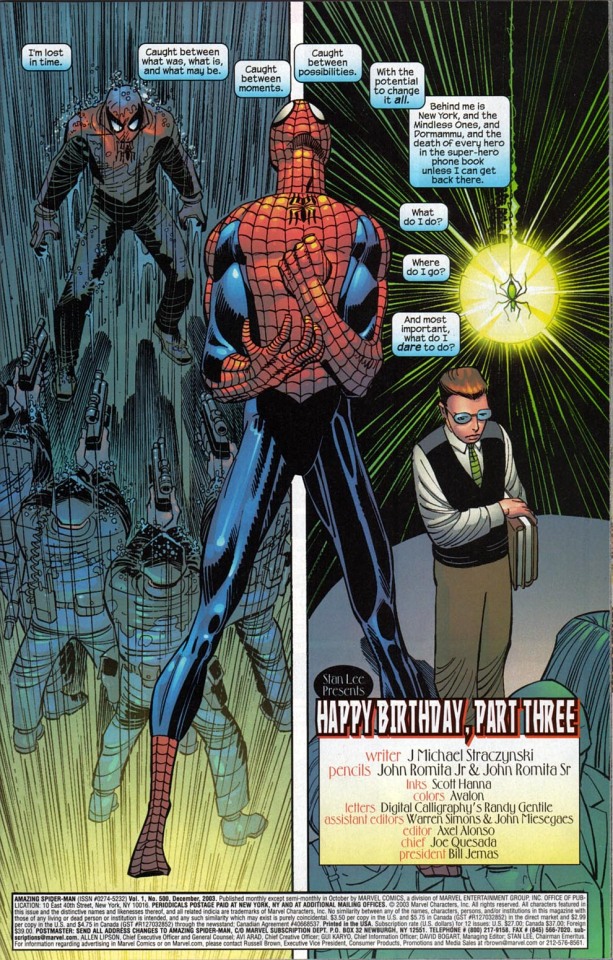
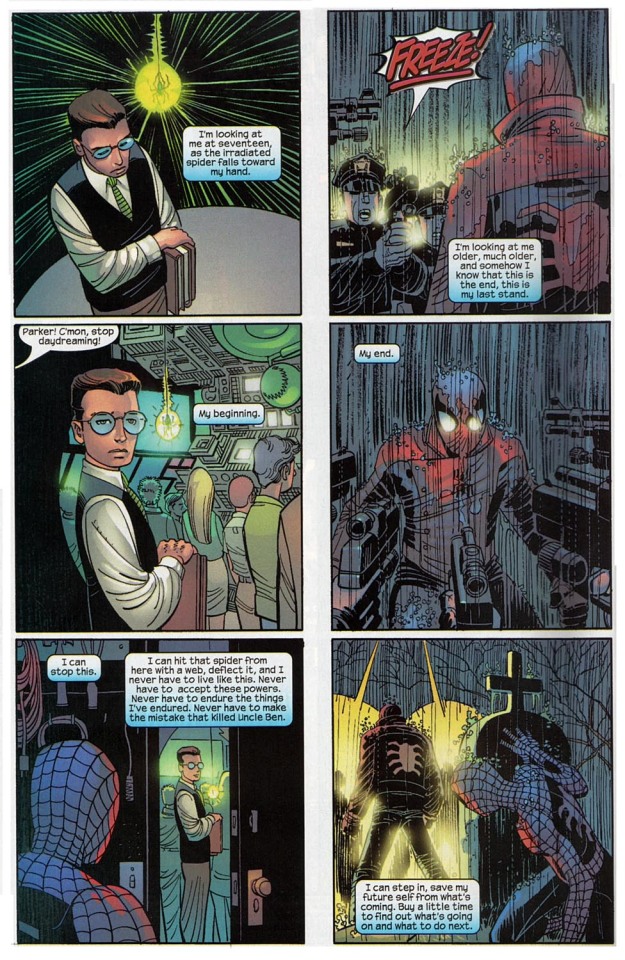
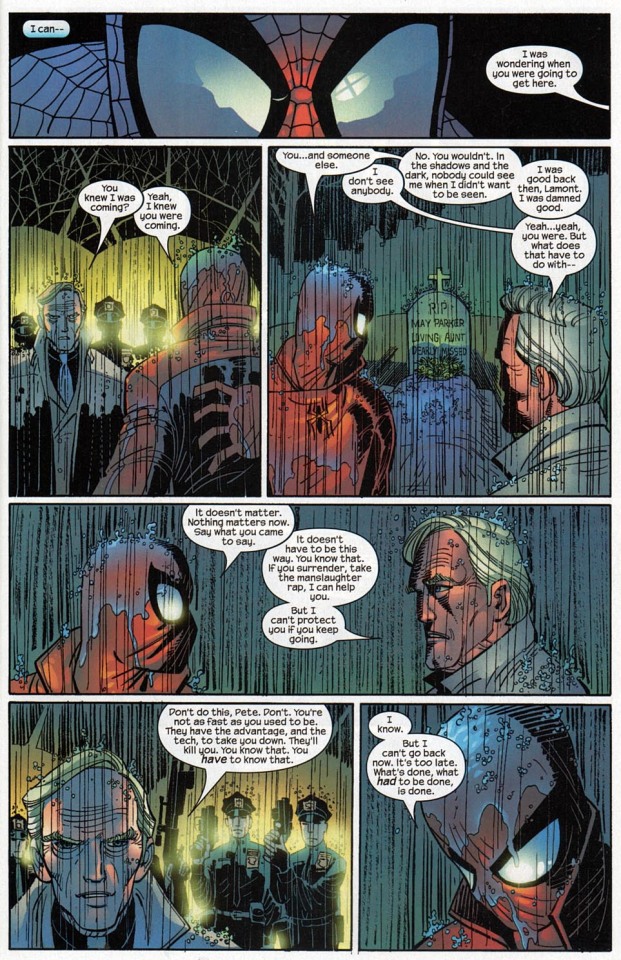
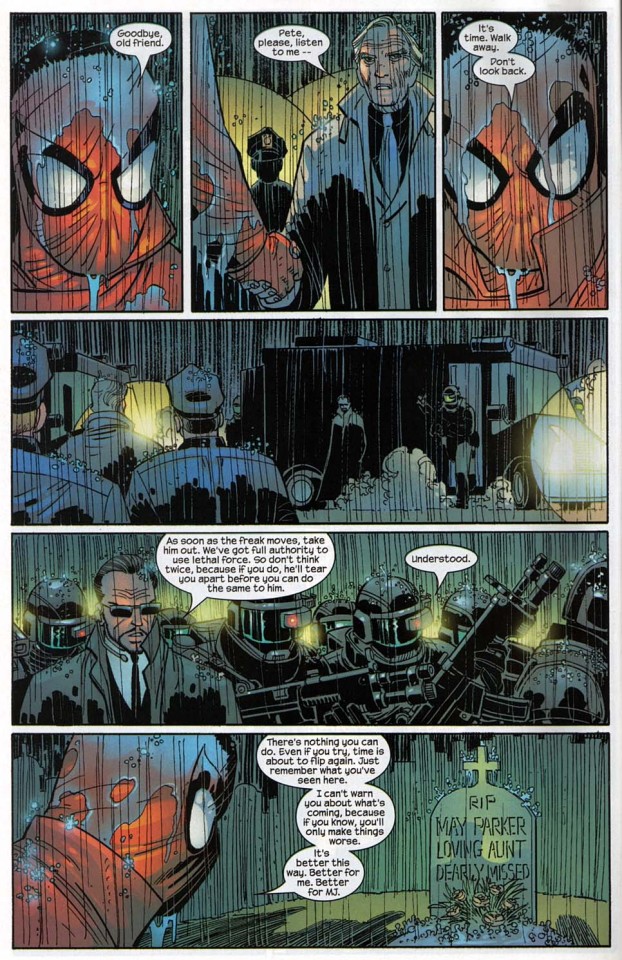

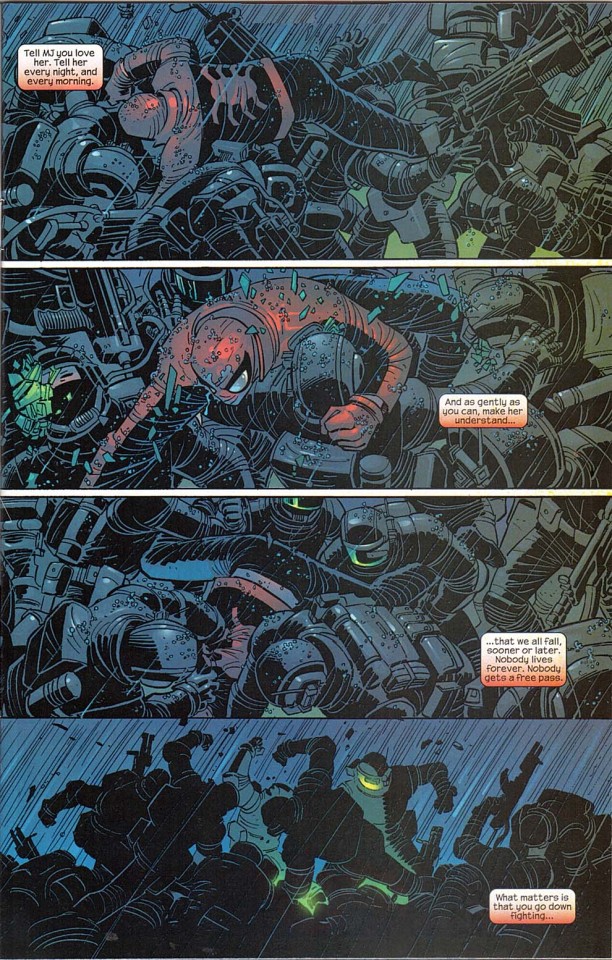



This isn’t personal?
Also amongst the 38 pages of this issue do you know how many feature the Mindless Ones, Dormammu or none Spider-Man characters (exempting instances like the Juggernaut) and have mostly not been about Spider-Man’s main personal journey in the story? 7 tops. And two of those was setting up the mechanics of the story to allow Spider-Man to return to his own timeline.
So the story is cluttered by all those things being in...less than 19% of the story? So...egregiously less than even ¼ of the overall story?
Okay.
5) The conversation between Peter and Uncle Ben is banal and says nothing of importance, not addressing Peter’s role in Ben’s death. Particularly this Spider-Man fan notes how if his father was alive again their conversation would be a lot more substantial.
This is probably my biggest bone to pick for various reasons because it speaks to frankly looking at the story far too superficially and also allowing personal life stuff to cloud your judgement. And also because, as you will hear me repeat going forward, this scene was ingenious.
First of all let’s get a little messy here and talk about the commenter and their father. I do not know the commenter very well and know even less of their father. But I do not need to in order to make my point because it is incredibly basic and obvious.
The commenter isn’t Spider-Man, their father wasn’t like Uncle Ben and their relationship with one another wasn’t like Peter and Ben’s.
I know this because
a) No one in real life is like Spider-Man or Uncle Ben
b) No one’s life experiences is like Spider-Man’s, not even police officers who have maybe the closest equivalent to Spider-Man’s life (and from what I know of the commenter they have never been a police officer)
c) No two people are identical on this earth in their personalities which by definition means no two people’s relationship will be identical to any other two people’s relationship. Especially when it comes to a relationship between a parent and child which is about as personal as you could get.
All of which renders the criticism that they would’ve said something different or more substantial to their briefly resurrected father entirely invalid.
Frankly, anyone seeking to truly analyze the scene or critique it should not be asking what THEY would’ve done in Peter’s position and instead be asking what made sense for Peter in the context of his life, personality and history would do. And at the same time what BEN would’ve done, something the commenter entirely neglected.
Which is in fact the real genius of the scene. It flips the script quite a bit to instead of having Peter seek a lot of answers from Ben, it actually shows us that Ben has somethings he wants to ask Peter.
Which is ingenious because after 40+ years we are entirely aware that Peter misses uncle Ben and wants to see him again. But the scene in ASM #500 makes the point that actually Ben would miss Peter too and would need to get a certain amount of closure from him, which I will get into a bit more shortly.
I think if Uncle Ben returned we’d all expect Peter to want to confess and ask Ben for forgiveness for his part in Ben’s death. And the thing is...he did that, or rather he tried too. Because JMS opted to take things a step further. He had Peter begin to ask Ben for forgiveness and for Ben to cut him off before specifics were said.
Which is again ingenious. Let’s be real here, based upon everything we’ve ever known about Uncle Ben (and putting aside how the Ben in this story clearly is aware he’s dead), he’d obviously forgive his nephew for his lack of action when he was 15 years old, especially in light of all he’s done since.
What JMS did was subvert that expectation and have Ben not forgive Peter, but go so far as to say that he doesn’t even consider what Peter did as something his nephew needs forgiveness for, not from him anyway. In one stroke Ben conveys to Peter and the reader that Peter is not atoned for his original sin but rather he never needed that atonement in the first place. Which had writers really paid attention, should have ended any BS guilt tripping Peter visited upon himself going forward when you think about it.
So off the top the issue not only addresses one of the major points of discussion everyone would’ve envisioned for this sort of scenario.
In fact, really as far as Peter is concerned what else is there really to talk about with Ben?
Remember by all accounts Peter and Ben had a very positive and fulfilling parent/child relationship. Peter and Ben’s last interaction wasn’t an argumentative or negative one from what we know. So there is no ‘unfinished business’ left to settle between them like there was between Harry and Norman when either of them were depicted to have died.
What else does Peter, within the mere five minutes he has with Uncle Ben, really got to say to his Uncle? Especially when you consider from his experiences with this stuff Ben is probably able to know or observe the stuff that goes on in Peter’s life. Like Peter really doesn’t have to tell Ben he’s married, or that he’s a teacher or even that he’s Spider-Man.
What else from a storytelling perspective does the specific character of Peter Parker (not you, me, the commenter or anyone else) need to say to Ben once the issue of his guilt over his death has been addressed? The answer is nothing really, at least nothing that we the readers really need to see him saying.
Returning to what I said above, JMS further subverts the expectations in this scenario by having Ben be the one who asks the questions. Cleverly though the focus is still on Peter. Ben is shown to be the one with concern for his son but in asking the questions we get to examine Peter.
Now this is not only brilliant for the reasons I’ve outlines, but because it is also touchingly realistic despite the fantastical scenario.
Whilst there are some shitty parents out there, most parents love their children, regard them as the most important things in their life and make their well-being their top priority.
In this issue we have a man who was the adoptive father of this kid who involuntarily had to leave his son when he was just 15 and still in need of parental guidance as he grew up. Now for a mere 5 minutes he gets the chance to see his son again when he’s all grown up. Even ignoring how he’s literally dead, Ben’s window of opportunity to raise and shape Peter, his son, closed a long time ago.
So instead (as discussed above) he does assuages Peter’s concerns and proceeds to do what frankly MOST parents in that situation would do. He seeks reassurance. Not for Peter’s sake but for his own.
He asks Peter two questions, the first of which boils down to
Have you tried to live a meaningful life?
Now granted Peter somewhat lies in his answer because when Ben asks if he ever walked away from what he believed ‘even once’ he says he never has when ASM #50 and ASM #100 alone are proof that that isn’t true. But then again earlier on Ben did comment that we all stumble and I suppose when you get right down to it, it’s more important that Peter kept coming back to his responsibilities as Spider-Man than the fact that on occasion he walked away from it for, at most, like a few months.
So Peter’s life is reaffirmed as one of meaning, which is a poignant question for a parent to have answered of their child. And also a poignant one for anyone to have to dig deep and answer of themselves as Peter did in that moment.
However it is not as poignant as Ben’s second question, one which goes to the heart of essentially every human being who’s ever lived.
Are you happy?
Let me break that down for you a little bit.
Uncle Ben is a man who never got to finish his job as a parent to his son Peter and never got to see the specifics of how his life unfolded.
Now in a very brief window of time he has the chance to find out first hand from his fully grown son if his efforts as a parent paid off.
And more pressingly he has the opportunity to know the thing virtually EVERY parent across the planet and all time has wanted to know.
Is my child happy?
Is the person whom I love more than anyone in my life or in the whole world, the person whom I can’t help anymore after years of trying to help them, are they happy?
Can I go back to where I came from, where I can’t see them or interact with them, with my mind at ease knowing that they are okay?
This is an entirely realistic thing for Ben to ask and something that fans probably considered a Hell of a lot less than Peter’s side of the scenario.
But the real brilliance of the scene is not in the fact that Ben as a parent would ask the question. But that it makes Peter ask it of himself.
Keep in mind the context of the scene.
Peter has just relived his life, or rather all the crazy super hero parts of it, i.e. the parts which have caused the most pain and problems in his life. The parts which do mostly amount to violence that’s gotten under his skin and threatened to break him. The parts which he has recently learned might possibly lead him down a dark path where he is falsely accused of a crime and killed by the very forces of justice he’s striven to help throughout his career.
And now Uncle Ben, his father, the man who’s death set him down that path which has cost him so much, the man whom miraculously he can see again for a mere five minutes and whom he would deny almost nothing to is asking him this question. The same question which, if you take a look back above, Doctor Strange was hinting at.
And it’s a question I think we’ve all asked of ourselves at one point or another. Hell you could go so far as to say it’s a question which hits right at the heart of life itself.
And in this milestone issue set on the anniversary of his very birth, Peter Parker tells the one man he could never lie to (and by extension the readers as a whole) that...yes.
Actually, despite all his suffering and talk of the ‘Parker Luck’, he feels he is very lucky and ultimately happy.
And that my friends is why the commenter was so very, very, very, very, very, very, very, very wrong in his assessment of this scene being unimportant and banal.
How on Earth could a scene which forces Spider-Man to take a hard look at his life, a life which he’s just revisited the worst highlights of, a life which has been published across 40+ years, and emerge saying that he is deep down happy and content, be meaningless?
How could it be anything even resembling banal?
That my friends is why for all it’s flaws and despite maybe not being enough of a milestone, Amazing Spider-Man #500 is most definitely a GOOD Spider-Man comic.
#Spider-Man#Peter Parker#uncle ben#ben parker#marvel#marvel comics#Doctor Strange#stephen strange#Dormammu#mindless ones#j michael straczynski
45 notes
·
View notes